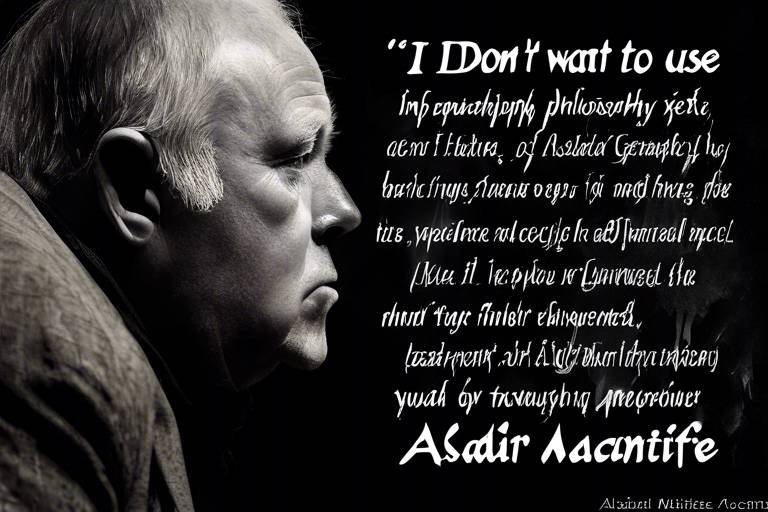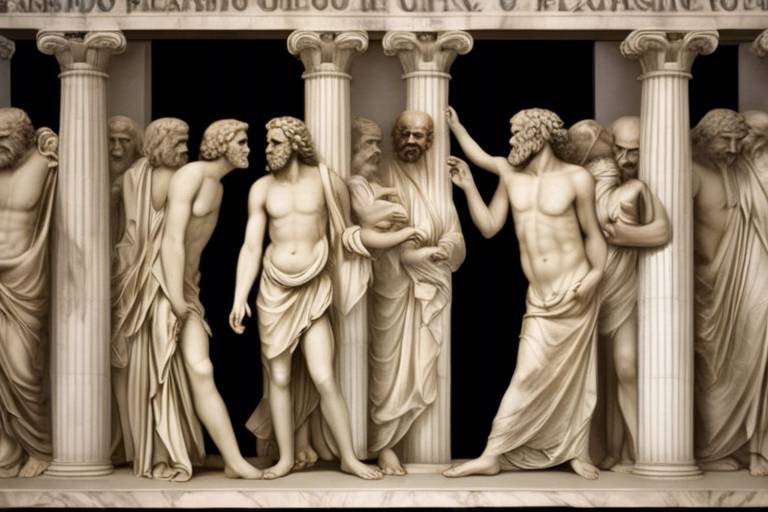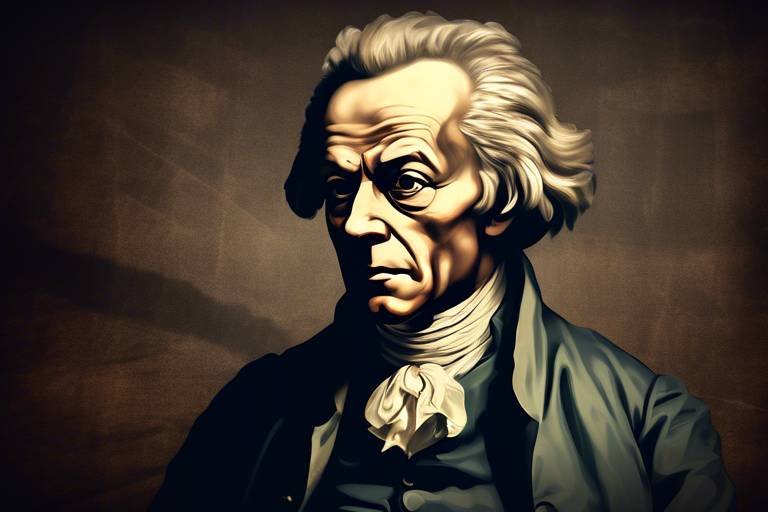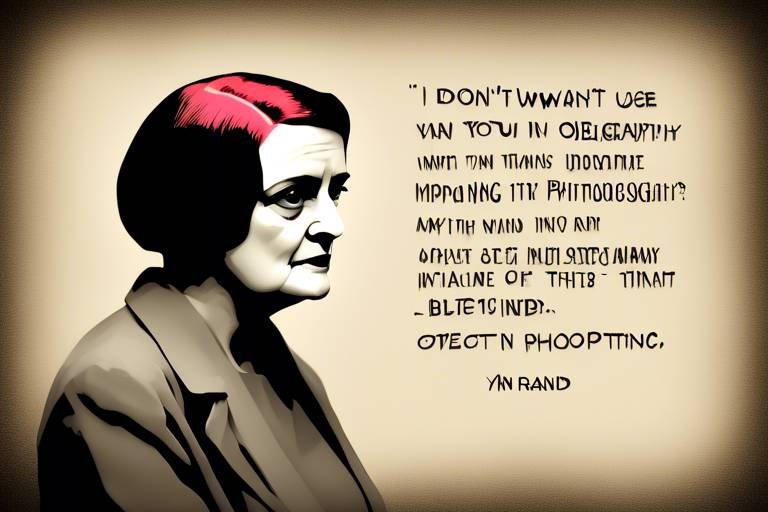Nietzsche's Will to Power - The Driving Force of His Philosophy
Friedrich Nietzsche, a name synonymous with philosophical rebellion, introduced the concept of the Will to Power as a cornerstone of his thought. But what does this really mean? At its core, the Will to Power is not merely about domination or control; rather, it embodies a fundamental drive that propels individuals towards creativity, growth, and self-overcoming. Imagine a force that compels you to rise above your circumstances, to challenge the status quo, and to forge your own path. This is the essence of Nietzsche's vision, a call to embrace life with all its chaos and complexity, transforming obstacles into opportunities for personal empowerment.
Nietzsche's philosophy emerged during a tumultuous period in European history, a time when traditional values were being questioned and redefined. The Will to Power serves as a response to this upheaval, advocating for a perspective that celebrates individual strength and creativity. It invites us to reflect on our motivations: Are we merely surviving, or are we actively shaping our destinies? This notion transcends the simplistic view of existence as a struggle for survival, suggesting instead that our true nature is to strive for greatness, to express our unique potentials, and to create meaning in our lives.
As we delve deeper into Nietzsche's philosophy, we see how the Will to Power challenges us to reject nihilism—a pervasive sense of meaninglessness that can grip individuals in times of crisis. Instead of succumbing to despair, Nietzsche encourages us to embrace life fully, to harness our inner strength, and to find joy in the act of creation. This perspective is not just philosophical; it’s deeply practical. It asks us to consider how we can take charge of our lives, to create our own values, and to live authentically in a world that often imposes rigid moral frameworks upon us.
Moreover, Nietzsche's Will to Power has profound psychological implications. It suggests that our desires and motivations are not merely products of social conditioning or instinctual drives; they are rooted in a deeper quest for dominance and self-overcoming. This idea resonates with many contemporary psychological theories that emphasize the importance of personal agency and the human capacity for growth. In essence, Nietzsche offers a lens through which we can examine our own lives, encouraging us to ask: What drives me? How can I channel my energy towards self-improvement and creative expression?
As we navigate through the complexities of modern existence, the relevance of Nietzsche's Will to Power becomes increasingly apparent. It has not only influenced philosophical discourse but has also permeated various fields, including psychology, art, and politics. By understanding and embracing this concept, we can cultivate a mindset that empowers us to confront challenges, embrace change, and ultimately, live a life that is rich with meaning and purpose.
- What is the Will to Power?
The Will to Power is a concept introduced by Nietzsche, representing an intrinsic drive within individuals to assert themselves, grow, and create meaning in their lives.
- How does the Will to Power relate to nihilism?
Nietzsche's Will to Power serves as a counter to nihilism, advocating for the embrace of life and the pursuit of individual strength and creativity in the face of existential despair.
- Can the Will to Power be applied in modern life?
Absolutely! The Will to Power encourages individuals to take charge of their lives, create their own values, and strive for personal empowerment and authenticity.

Will to Power,
This article explores Friedrich Nietzsche's concept of the Will to Power, examining its significance in his philosophy, its implications for human existence, and its influence on modern thought.
Nietzsche's Will to Power serves as a central theme in his philosophy, representing a fundamental drive that motivates human behavior and creativity, transcending mere survival instincts. Imagine the Will to Power as a relentless river, carving its path through the landscape of human experience. It is not just about survival; it is about flourishing, overcoming obstacles, and asserting one's presence in the world. Nietzsche believed that this drive is intrinsic to all living beings, pushing us to strive for greatness, to create, and to leave our mark on the world. In essence, the Will to Power encapsulates the idea that life is not merely about existing but about thriving and asserting one's will in the face of challenges.
Understanding the historical backdrop of Nietzsche's life enhances our comprehension of the Will to Power, as it emerged during a time of philosophical upheaval and cultural transformation in Europe. The 19th century was a period of significant change, marked by the decline of traditional religious values and the rise of scientific rationalism. Nietzsche's philosophy can be seen as a response to this shifting landscape, where he sought to redefine the meaning of existence in a world that seemed increasingly devoid of inherent purpose. His ideas were revolutionary, challenging the status quo and urging individuals to embrace their instincts and desires as a source of strength and creativity.
Arthur Schopenhauer's pessimistic philosophy significantly impacted Nietzsche, prompting him to develop the Will to Power as a more affirmative response to existence and life's challenges. Schopenhauer posited that life is fundamentally driven by a blind, irrational will, leading to suffering and despair. In contrast, Nietzsche took this notion and flipped it on its head, suggesting that the Will to Power is not merely a source of struggle but a catalyst for growth and creativity. He saw the potential for individuals to harness their inner strength, transforming suffering into a powerful force for self-overcoming and self-creation.
Nietzsche's Will to Power acts as a counter to nihilism, advocating for the embrace of life and the pursuit of individual strength and creativity in the face of existential despair. Rather than succumbing to the belief that life is meaningless, Nietzsche encourages us to forge our own paths and create our own values. This rejection of nihilism is not just philosophical; it is a call to action, urging individuals to rise above despair and assert their will in the world. The Will to Power becomes a beacon of hope, guiding us toward a life filled with purpose and meaning.
Through the Will to Power, Nietzsche argues that individuals must create their own values and meanings, rejecting imposed moral systems and fostering personal empowerment. In a world where traditional values are crumbling, Nietzsche challenges us to become the architects of our own moral frameworks. This idea resonates deeply in today's society, where individuals are often faced with conflicting values and beliefs. By embracing the Will to Power, we can take control of our lives, define our own purposes, and cultivate a sense of authenticity that empowers us to live fully and passionately.
The Will to Power also offers insights into human psychology, suggesting that our motivations and desires are deeply rooted in a quest for dominance and self-overcoming. This perspective invites us to reflect on our own lives: how often do we find ourselves striving for more, seeking to improve, or pushing against our limitations? Nietzsche's idea encourages us to view these impulses not as mere ambitions but as expressions of our fundamental drive to assert ourselves and make an impact on the world around us.
Nietzsche's ideas on the Will to Power have profoundly influenced contemporary philosophical discourse, inspiring existentialism, postmodernism, and various movements that challenge traditional moral frameworks. His emphasis on individual empowerment and the creation of values resonates with many modern thinkers who grapple with the complexities of existence in a rapidly changing world.
Existentialist thinkers, such as Sartre and Camus, draw upon Nietzsche's Will to Power to explore themes of authenticity, freedom, and the individual's role in creating meaning in an indifferent universe. They echo Nietzsche's call for individuals to take charge of their own destinies and to find personal significance in a world that often appears chaotic and devoid of meaning.
Postmodern philosophers reinterpret the Will to Power as a critique of grand narratives, emphasizing the fluidity of truth and the importance of power dynamics in shaping knowledge and culture. This perspective challenges the idea of absolute truths, suggesting instead that our understanding of reality is shaped by the interplay of various forces and perspectives. Nietzsche's vision of the Will to Power thus becomes a lens through which we can examine the complexities of power, knowledge, and identity in contemporary society.
- What is the Will to Power? - The Will to Power is a central concept in Nietzsche's philosophy, representing a fundamental drive that motivates human behavior and creativity.
- How did Schopenhauer influence Nietzsche? - Schopenhauer's pessimistic view of life prompted Nietzsche to develop the Will to Power as a more affirmative response to existence.
- What does Nietzsche mean by rejecting nihilism? - Nietzsche's rejection of nihilism advocates for embracing life and creating individual values instead of succumbing to despair.
- How does the Will to Power relate to modern philosophy? - Nietzsche's ideas have influenced existentialism and postmodernism, challenging traditional moral frameworks and emphasizing individual empowerment.

examining its significance in his philosophy, its implications for human existence, and its influence on modern thought.
This article explores Friedrich Nietzsche's concept of the Will to Power, examining its significance in his philosophy, its implications for human existence, and its influence on modern thought.
Nietzsche's Will to Power serves as a central theme in his philosophy, representing a fundamental drive that motivates human behavior and creativity, transcending mere survival instincts.
Understanding the historical backdrop of Nietzsche's life enhances our comprehension of the Will to Power, as it emerged during a time of philosophical upheaval and cultural transformation in Europe.
Arthur Schopenhauer's pessimistic philosophy significantly impacted Nietzsche, prompting him to develop the Will to Power as a more affirmative response to existence and life's challenges.
Nietzsche's Will to Power acts as a counter to nihilism, advocating for the embrace of life and the pursuit of individual strength and creativity in the face of existential despair.
Through the Will to Power, Nietzsche argues that individuals must create their own values and meanings, rejecting imposed moral systems and fostering personal empowerment.
The Will to Power also offers insights into human psychology, suggesting that our motivations and desires are deeply rooted in a quest for dominance and self-overcoming.
Nietzsche's ideas on the Will to Power have profoundly influenced contemporary philosophical discourse, inspiring existentialism, postmodernism, and various movements that challenge traditional moral frameworks.
Existentialist thinkers, such as Sartre and Camus, draw upon Nietzsche's Will to Power to explore themes of authenticity, freedom, and the individual's role in creating meaning in an indifferent universe.
Postmodern philosophers reinterpret the Will to Power as a critique of grand narratives, emphasizing the fluidity of truth and the importance of power dynamics in shaping knowledge and culture.
Nietzsche's concept of the Will to Power is not just a central theme; it is the very essence of his philosophical inquiry. It encapsulates a dynamic view of human existence, where the drive to assert and enhance one's power is paramount. This idea challenges the traditional view of morality and existence, suggesting that life is not merely about survival or adherence to societal norms. Instead, it is about the flourishing of one's individuality and the constant quest for greater strength and creativity. The Will to Power is a call to action, urging individuals to embrace their desires and ambitions, fostering a sense of personal responsibility for one's life and values.
Moreover, the implications of this concept extend deeply into the realm of human existence. By advocating for the Will to Power, Nietzsche encourages a mindset of resilience and self-overcoming. It posits that individuals are not passive recipients of life but active creators of meaning. This philosophy resonates with many who feel the weight of societal expectations and the constraints of traditional morality. In a world that often seems indifferent or even hostile, the Will to Power serves as a beacon, illuminating the path toward personal empowerment and authenticity.
As we navigate through modern thought, the influence of Nietzsche's Will to Power is unmistakable. It has paved the way for various philosophical movements that prioritize individual experience over universal truths. Existentialists, for instance, have embraced this idea to explore the depths of human freedom and the responsibility that comes with it. They argue that in a world devoid of inherent meaning, it is up to each individual to forge their own path, a notion that aligns seamlessly with Nietzsche's vision.
In addition, postmodern thinkers have taken Nietzsche's insights and applied them to critique the very foundations of knowledge and power structures. They argue that truth is not a singular, absolute entity but rather a construct shaped by power dynamics. This perspective invites a more nuanced understanding of history, culture, and human relationships, making the Will to Power a crucial element in contemporary discussions about identity and authority.
In essence, Nietzsche's Will to Power is far more than a philosophical concept; it is a revolutionary idea that challenges us to rethink our existence, our values, and our place in the world. It encourages a life lived with intention, creativity, and a relentless pursuit of self-mastery.
- What is the Will to Power? - It is a central concept in Nietzsche's philosophy, representing the fundamental drive that motivates human behavior and creativity.
- How does the Will to Power relate to nihilism? - Nietzsche's Will to Power serves as a counter to nihilism, advocating for the embrace of life and personal empowerment.
- What impact has Nietzsche's philosophy had on modern thought? - Nietzsche's ideas have influenced existentialism, postmodernism, and various movements that challenge traditional moral frameworks.

The Concept of Will to Power
Friedrich Nietzsche’s Will to Power is not just a catchy phrase; it’s a profound concept that encapsulates the essence of human motivation and creativity. At its core, the Will to Power represents a fundamental drive within each individual, pushing us beyond mere survival instincts. Imagine it as an inner engine that fuels our ambitions, desires, and aspirations, compelling us to strive for greatness and assert our influence over our surroundings. Nietzsche posited that this drive is far more potent than the basic instincts of survival or reproduction; it is a relentless quest for mastery and self-overcoming.
In essence, the Will to Power can be viewed as a life force, a vibrant energy that propels us to push boundaries, challenge norms, and create our own destinies. Nietzsche believed that this drive manifests in various forms, whether it be through artistic expression, intellectual pursuits, or the establishment of personal values. It’s as if each person is an artist, sculpting their life and identity from the raw materials of their experiences and desires.
To better understand this concept, let’s break it down into its key components:
- Striving for Dominance: The Will to Power is fundamentally about exerting influence and achieving a sense of control over one’s environment. This doesn’t necessarily imply a tyrannical domination over others but rather an assertion of one’s presence and agency in the world.
- Self-Overcoming: Nietzsche emphasized the importance of transcending one’s limitations. The Will to Power encourages individuals to confront their fears and weaknesses, transforming them into strengths through personal growth and resilience.
- Creation of Values: Rather than accepting pre-existing moral frameworks, the Will to Power urges individuals to forge their own paths and create values that resonate with their unique experiences and perspectives.
Nietzsche’s idea challenges us to embrace our innate desires and ambitions rather than suppress them. It’s a call to action, urging us to recognize that life is not merely a series of passive experiences but a dynamic interplay of forces where we can actively shape our destinies. This concept resonates deeply in contemporary discussions about personal empowerment and the pursuit of authenticity.
Moreover, the Will to Power isn't just a philosophical abstraction; it has real-world implications. In a society that often imposes rigid structures and norms, Nietzsche invites us to break free and explore the vast potential of our individual capabilities. It’s about daring to dream and having the courage to chase those dreams, even in the face of adversity. Just as a river carves its path through the landscape, so too can we navigate our lives with intention and purpose, driven by our inner will.
In conclusion, Nietzsche’s Will to Power is a compelling framework for understanding human motivation and creativity. It encourages us to embrace our desires, challenge societal norms, and create a life that reflects our true selves. By recognizing the power within us, we can transform our existence from a mere survivalist approach into a vibrant tapestry of personal achievements and meaningful contributions to the world.

Will to Power
This article explores Friedrich Nietzsche's concept of the , examining its significance in his philosophy, its implications for human existence, and its influence on modern thought.
Nietzsche's serves as a central theme in his philosophy, representing a fundamental drive that motivates human behavior and creativity, transcending mere survival instincts. Imagine for a moment that life is not just about existing or getting by; instead, it's a vibrant dance of ambition, creativity, and the relentless pursuit of greatness. Nietzsche believed that this drive was not merely about the will to survive, but rather a powerful urge to assert oneself, to dominate one's environment, and to shape one’s destiny. This concept invites us to reflect: what does it mean to truly live? Is it enough to simply exist, or should we strive to leave our mark on the world?
Understanding the historical backdrop of Nietzsche's life enhances our comprehension of the , as it emerged during a time of philosophical upheaval and cultural transformation in Europe. The late 19th century was a period characterized by rapid industrialization, shifting social norms, and a questioning of traditional values. In this climate, Nietzsche's ideas resonated with those seeking deeper meaning in a world that seemed increasingly chaotic. He challenged the prevailing notions of morality and truth, urging individuals to embrace their instincts and assert their will in a world devoid of inherent meaning. The thus became a rallying cry for those eager to forge their own paths amidst the uncertainty.
Arthur Schopenhauer's pessimistic philosophy significantly impacted Nietzsche, prompting him to develop the as a more affirmative response to existence and life's challenges. While Schopenhauer viewed life through a lens of suffering and desire, Nietzsche saw the potential for creativity and strength. He transformed Schopenhauer's ideas into a more dynamic philosophy, suggesting that the drive for power is not just about domination over others, but also about mastering oneself. This shift is crucial; it positions the as a source of personal empowerment rather than mere conquest.
Nietzsche's acts as a counter to nihilism, advocating for the embrace of life and the pursuit of individual strength and creativity in the face of existential despair. Nihilism, the belief that life lacks purpose or meaning, was a pervasive sentiment during Nietzsche's time. In stark contrast, he proposed that individuals could create their own values and meanings through the . By rejecting nihilism, Nietzsche encouraged us to confront our fears and uncertainties head-on, transforming them into opportunities for growth and self-discovery.
Through the , Nietzsche argues that individuals must create their own values and meanings, rejecting imposed moral systems and fostering personal empowerment. This idea is revolutionary: instead of adhering to societal expectations or inherited beliefs, we are challenged to become the architects of our own lives. By embracing our unique desires and ambitions, we can carve out a space for ourselves in a world that often tries to define us. Nietzsche's call to action is clear: seize your power, craft your values, and live authentically.
The also offers insights into human psychology, suggesting that our motivations and desires are deeply rooted in a quest for dominance and self-overcoming. It’s as if Nietzsche invites us to look within ourselves and recognize that our struggles and aspirations are not just random occurrences but integral parts of our human experience. This perspective encourages a deeper understanding of our actions, pushing us to consider how our innate desires shape our interactions and relationships. Are we merely responding to external pressures, or are we actively shaping our realities through our will?
Nietzsche's ideas on the have profoundly influenced contemporary philosophical discourse, inspiring existentialism, postmodernism, and various movements that challenge traditional moral frameworks. His thoughts resonate with those grappling with the complexities of modern existence, offering a lens through which to view our struggles and triumphs. The serves as a reminder that we are not passive observers in our lives; rather, we are active participants, capable of forging our own paths.
Existentialist thinkers, such as Sartre and Camus, draw upon Nietzsche's to explore themes of authenticity, freedom, and the individual's role in creating meaning in an indifferent universe. They echo Nietzsche's sentiments that life is not predetermined; instead, it is shaped by our choices and actions. This emphasis on personal responsibility and authenticity invites us to reflect on our own lives: are we living authentically, or are we merely conforming to societal expectations?
Postmodern philosophers reinterpret the as a critique of grand narratives, emphasizing the fluidity of truth and the importance of power dynamics in shaping knowledge and culture. They challenge the idea of absolute truths, suggesting instead that our understanding of the world is influenced by various perspectives and power relations. This perspective aligns with Nietzsche's assertion that power is not just about domination, but also about the ability to influence and shape narratives.
- What is the Will to Power? - The Will to Power is a central concept in Nietzsche's philosophy, representing the fundamental drive for human ambition, creativity, and the assertion of one's own values.
- How did Nietzsche's background influence his philosophy? - Nietzsche lived during a time of cultural upheaval in Europe, which shaped his thoughts on morality, meaning, and the human condition.
- What is the relationship between the Will to Power and nihilism? - The Will to Power serves as a counter to nihilism, promoting the idea of creating one's own values rather than succumbing to despair.
- How has the Will to Power influenced modern philosophy? - Nietzsche's ideas have inspired various philosophical movements, including existentialism and postmodernism, encouraging individuals to explore authenticity and the fluidity of truth.

serves as a central theme in his philosophy, representing a fundamental drive that motivates human behavior and creativity, transcending mere survival instincts.
Nietzsche's Will to Power serves as a central theme in his philosophy, representing a fundamental drive that motivates human behavior and creativity, transcending mere survival instincts. This concept is not just about the desire for dominance over others; rather, it embodies a profound urge to assert oneself, to grow, and to realize one's full potential. Imagine it as a river, flowing through the landscape of human experience, carving out new paths and shaping the terrain of our lives. Just as a river seeks its course, so too does the Will to Power compel individuals to pursue their ambitions and passions, pushing the boundaries of what is possible.
At its core, the Will to Power reflects an intrinsic motivation that goes beyond basic needs. While many philosophies focus on survival or pleasure as the primary drivers of human action, Nietzsche invites us to consider a more dynamic force. This drive is about creativity and the relentless pursuit of excellence. Think of artists, scientists, and innovators who are not merely trying to survive but are instead striving to create something new and meaningful. They embody the essence of Nietzsche's philosophy, where the Will to Power becomes a catalyst for transformation and progress.
Furthermore, the Will to Power encourages individuals to embrace challenges and adversity. Rather than shying away from difficulties, Nietzsche suggests that we should confront them head-on. It’s akin to a blacksmith forging a sword; the heat and pressure are essential to shaping a strong blade. In the same way, our struggles and obstacles can forge our character and capabilities. This transformative aspect of the Will to Power not only enhances personal growth but also contributes to the collective advancement of society.
In practical terms, this philosophy can be applied to everyday life. When faced with obstacles, individuals can ask themselves: “How can I turn this challenge into an opportunity for growth?” By adopting this mindset, we align ourselves with the Will to Power, allowing it to guide our actions and decisions. The more we engage with this drive, the more we unlock our potential, leading to a richer and more fulfilling existence.
Ultimately, Nietzsche's Will to Power is a call to action. It urges us to take ownership of our lives, to create our own values, and to pursue our passions with vigor. It’s about harnessing the energy within us to not only navigate the world but to also leave a mark on it. This powerful drive is what separates mere existence from a life of purpose and significance. So, the next time you feel the urge to push beyond your limits, remember that you are tapping into the very essence of what it means to be human, as envisioned by Nietzsche.
- What is Nietzsche's Will to Power?
The Will to Power is a central concept in Nietzsche's philosophy that represents the fundamental drive motivating human behavior and creativity, going beyond mere survival instincts. - How does the Will to Power influence creativity?
It encourages individuals to assert themselves, pursue their passions, and embrace challenges, leading to personal growth and innovation. - Can the Will to Power be applied to everyday life?
Yes! It can be applied by viewing obstacles as opportunities for growth and taking ownership of one’s actions and decisions. - Is the Will to Power about domination over others?
Not necessarily. While it includes the idea of asserting oneself, it primarily focuses on self-overcoming and personal empowerment.

Historical Context
This article explores Friedrich Nietzsche's concept of the Will to Power, examining its significance in his philosophy, its implications for human existence, and its influence on modern thought.
Nietzsche's Will to Power serves as a central theme in his philosophy, representing a fundamental drive that motivates human behavior and creativity, transcending mere survival instincts.
Understanding the historical backdrop of Nietzsche's life enhances our comprehension of the Will to Power, as it emerged during a time of philosophical upheaval and cultural transformation in Europe. Born in 1844, Nietzsche lived through a period marked by rapid industrialization, scientific advancements, and a shifting landscape in religious and philosophical thought. The decline of traditional Christian values and the rise of secularism created a fertile ground for Nietzsche's radical ideas.
During the late 19th century, Europe was grappling with profound existential questions. Traditional authorities were being challenged, and people were increasingly questioning the very foundations of morality, truth, and existence. This was a time when thinkers like Karl Marx were critiquing capitalism, and Sigmund Freud was delving into the complexities of the human psyche. In this context, Nietzsche's philosophy emerged as a bold response to the chaos surrounding him.
One of the most significant influences on Nietzsche was the philosopher Arthur Schopenhauer, whose pessimistic view of life deeply resonated with him. Schopenhauer posited that life was filled with suffering and that human desires were ultimately insatiable. In reaction to this bleak outlook, Nietzsche sought to redefine existence through the lens of the Will to Power. He believed that rather than succumbing to despair, individuals could harness their instincts and drive to create meaning and assert their existence in a seemingly indifferent universe.
Moreover, the backdrop of the German unification and the rise of nationalism also played a role in shaping Nietzsche's thoughts. The fervor of nationalism and the quest for identity prompted Nietzsche to explore the idea of individualism versus collective values. He argued that the Will to Power was not just a personal ambition but also a reflection of the broader cultural dynamics at play. In a sense, it was a call to arms for individuals to rise above the mediocrity of societal norms and assert their unique identities.
In this tumultuous environment, Nietzsche's rejection of nihilism became particularly poignant. He viewed nihilism as a consequence of the loss of faith in traditional values and the resultant existential void. The Will to Power, therefore, was not merely a philosophical concept; it was a lifeline for individuals seeking purpose in a world that seemed devoid of inherent meaning. By advocating for the creation of personal values, Nietzsche encouraged people to embrace their instincts and desires, thus fostering a sense of empowerment and creativity.
Arthur Schopenhauer's pessimistic philosophy significantly impacted Nietzsche, prompting him to develop the Will to Power as a more affirmative response to existence and life's challenges.
Nietzsche's Will to Power acts as a counter to nihilism, advocating for the embrace of life and the pursuit of individual strength and creativity in the face of existential despair.
Through the Will to Power, Nietzsche argues that individuals must create their own values and meanings, rejecting imposed moral systems and fostering personal empowerment.
The Will to Power also offers insights into human psychology, suggesting that our motivations and desires are deeply rooted in a quest for dominance and self-overcoming.
Nietzsche's ideas on the Will to Power have profoundly influenced contemporary philosophical discourse, inspiring existentialism, postmodernism, and various movements that challenge traditional moral frameworks.
Existentialist thinkers, such as Sartre and Camus, draw upon Nietzsche's Will to Power to explore themes of authenticity, freedom, and the individual's role in creating meaning in an indifferent universe.
Postmodern philosophers reinterpret the Will to Power as a critique of grand narratives, emphasizing the fluidity of truth and the importance of power dynamics in shaping knowledge and culture.
- What is Nietzsche's Will to Power?
It is a fundamental drive that motivates human behavior, creativity, and the pursuit of individual strength.
- How did Schopenhauer influence Nietzsche?
Schopenhauer's pessimism prompted Nietzsche to develop a more affirmative philosophy centered on the Will to Power.
- What is the significance of the historical context in understanding Nietzsche?
The historical backdrop of Nietzsche's life, including the decline of traditional values and the rise of nationalism, shaped his thoughts on individualism and morality.
- How does the Will to Power relate to modern philosophy?
It has influenced existentialism and postmodernism, challenging traditional moral frameworks and emphasizing personal empowerment.

Will to Power,
This article explores Friedrich Nietzsche's concept of the Will to Power, examining its significance in his philosophy, its implications for human existence, and its influence on modern thought.
Nietzsche's Will to Power serves as a central theme in his philosophy, representing a fundamental drive that motivates human behavior and creativity, transcending mere survival instincts. Imagine for a moment that life is not just a series of challenges to overcome, but a canvas on which we paint our desires and aspirations. The Will to Power embodies this idea, suggesting that our innate drive is not merely to survive, but to thrive, to assert ourselves, and to shape our destinies. This concept invites us to consider how our actions are fueled by an underlying force that seeks growth, achievement, and mastery over our circumstances.
Understanding the historical backdrop of Nietzsche's life enhances our comprehension of the Will to Power, as it emerged during a time of philosophical upheaval and cultural transformation in Europe. The late 19th century was a period marked by rapid change, scientific discoveries, and the questioning of traditional values. Nietzsche found himself in a world grappling with the implications of modernity, where the certainties of religion and morality were being challenged.
Arthur Schopenhauer's pessimistic philosophy significantly impacted Nietzsche, prompting him to develop the Will to Power as a more affirmative response to existence and life's challenges. Schopenhauer viewed life through a lens of suffering and despair, suggesting that our desires lead to perpetual dissatisfaction. In contrast, Nietzsche flipped this narrative on its head. He argued that rather than succumbing to nihilism, we should embrace our desires and channel them into creative and life-affirming endeavors. The Will to Power becomes a declaration of our potential to rise above suffering and assert our existence through creativity and strength.
Nietzsche's Will to Power acts as a counter to nihilism, advocating for the embrace of life and the pursuit of individual strength and creativity in the face of existential despair. Nihilism, with its bleak outlook, suggests that life is devoid of meaning. However, Nietzsche challenges this notion by proposing that we have the power to create our own meaning. By embracing the Will to Power, individuals can find purpose in their struggles and assert their existence in a world that often feels indifferent.
Through the Will to Power, Nietzsche argues that individuals must create their own values and meanings, rejecting imposed moral systems and fostering personal empowerment. This idea resonates deeply in a world where societal norms often dictate how we should live. Nietzsche encourages us to break free from these constraints, to forge our own paths, and to define what is valuable based on our unique experiences and desires. In this way, the Will to Power becomes a call to action, urging us to take ownership of our lives and craft our own destinies.
The Will to Power also offers insights into human psychology, suggesting that our motivations and desires are deeply rooted in a quest for dominance and self-overcoming. This perspective invites us to reflect on our ambitions and the underlying forces that drive us. Are we merely seeking comfort and security, or is there a deeper urge to assert ourselves and make an impact? Nietzsche's philosophy challenges us to explore these questions and recognize that the desire for power can manifest in various forms, from personal achievements to creative expressions.
Nietzsche's ideas on the Will to Power have profoundly influenced contemporary philosophical discourse, inspiring existentialism, postmodernism, and various movements that challenge traditional moral frameworks. His emphasis on individual empowerment and the rejection of absolute truths resonates with many modern thinkers who seek to navigate the complexities of contemporary life.
Existentialist thinkers, such as Sartre and Camus, draw upon Nietzsche's Will to Power to explore themes of authenticity, freedom, and the individual's role in creating meaning in an indifferent universe. They emphasize the importance of personal choice and the responsibility that comes with it. In a world that often feels chaotic, the Will to Power serves as a reminder that we have the capacity to shape our own identities and destinies.
Postmodern philosophers reinterpret the Will to Power as a critique of grand narratives, emphasizing the fluidity of truth and the importance of power dynamics in shaping knowledge and culture. They argue that truth is not a fixed entity but rather a construct influenced by various social and historical contexts. This perspective aligns with Nietzsche's assertion that power plays a crucial role in the formation of values and beliefs, encouraging us to question established norms and embrace a more nuanced understanding of truth.
- What is the Will to Power? The Will to Power is a central concept in Nietzsche's philosophy, representing the fundamental drive that motivates human behavior and creativity.
- How did Schopenhauer influence Nietzsche? Schopenhauer's pessimistic philosophy prompted Nietzsche to develop the Will to Power as a more affirmative response to existence.
- What does Nietzsche mean by rejecting nihilism? Nietzsche's rejection of nihilism advocates for embracing life and creating personal meaning in the face of despair.
- How has the Will to Power influenced modern philosophy? The Will to Power has inspired existentialism and postmodernism, challenging traditional moral frameworks and emphasizing individual empowerment.

as it emerged during a time of philosophical upheaval and cultural transformation in Europe.
To truly grasp the essence of Nietzsche's Will to Power, it's crucial to consider the historical backdrop against which he wrote. The late 19th century was a period rife with philosophical upheaval and cultural transformation in Europe. This was an era marked by the decline of traditional religious beliefs, the rise of scientific rationalism, and a growing skepticism towards established moral values. As the Enlightenment ideals began to take root, thinkers started questioning the very foundations of society, leading to a cultural landscape that was both dynamic and tumultuous.
Nietzsche found himself amidst these shifting sands, where old certainties were crumbling. The Industrial Revolution was changing the fabric of society, bringing about not just economic changes but also altering human relationships and self-perceptions. People were grappling with the implications of rapid technological advancements, which often left them feeling alienated and lost. In this chaotic environment, Nietzsche's philosophy emerged as a bold response to the existential crises of his time.
Moreover, the influence of philosophers like Arthur Schopenhauer cannot be understated. Schopenhauer's ideas about the will and suffering resonated deeply with Nietzsche, who sought to transform this pessimistic outlook into a more empowering philosophy. He proposed that rather than merely enduring life, individuals should strive for greatness through their own Will to Power. This was not just a personal struggle but a broader cultural call to arms, urging humanity to rise above nihilism and embrace a life of creativity and strength.
During this period, Europe was also witnessing significant political changes. The rise of nationalism, along with various social movements advocating for rights and freedoms, contributed to a sense of urgency and possibility. Nietzsche's Will to Power can be seen as a reflection of this zeitgeist, advocating for the individual to assert their own values in a world that seemed increasingly indifferent to human suffering and aspiration.
In summary, the Will to Power did not emerge in a vacuum; it was a response to the cultural and philosophical crises of Nietzsche's time. As Europe grappled with the consequences of modernity, Nietzsche's ideas offered a radical rethinking of human motivation and potential, challenging individuals to reclaim their strength and purpose in a rapidly changing world.
- What is Nietzsche's Will to Power?
The Will to Power is a central concept in Nietzsche's philosophy, representing the fundamental drive that motivates human behavior and creativity, transcending mere survival instincts. - How did historical context influence Nietzsche's philosophy?
Nietzsche's philosophy was shaped by the philosophical upheaval of the late 19th century, which included the decline of traditional beliefs and the rise of scientific rationalism, prompting him to propose a more affirmative approach to existence. - What role did Schopenhauer play in Nietzsche's thought?
Schopenhauer's pessimistic philosophy influenced Nietzsche, leading him to develop the Will to Power as a more positive response to existence and life's challenges. - How does the Will to Power relate to modern philosophy?
Nietzsche's ideas on the Will to Power have significantly influenced contemporary philosophical discourse, inspiring movements such as existentialism and postmodernism.

Influence of Schopenhauer
Arthur Schopenhauer, often regarded as one of the most significant influences on Friedrich Nietzsche, introduced a philosophy that was steeped in pessimism. His central idea revolved around the concept of the "Will," which he perceived as a blind and insatiable force driving human behavior. For Schopenhauer, life was essentially a cycle of suffering, where desires could never be fully satisfied. This bleak outlook initially resonated with Nietzsche, who found himself grappling with similar existential questions. However, instead of succumbing to despair, Nietzsche sought to transform this pessimistic view into something more affirmative.
Nietzsche's Will to Power emerged as a direct counterpoint to Schopenhauer's philosophy. While Schopenhauer emphasized resignation and the denial of desires as a means to alleviate suffering, Nietzsche proposed that embracing one's instincts and desires could lead to a more vibrant and meaningful existence. This shift from a passive acceptance of fate to an active engagement with life represented a pivotal moment in Nietzsche's philosophical development.
In fact, Nietzsche's adaptation of Schopenhauer's ideas can be summarized in the following ways:
| Schopenhauer's Philosophy | Nietzsche's Response |
|---|---|
| Pessimism and suffering as the essence of life | Embrace of life and creation of meaning |
| Denial of desires to escape suffering | Channeling desires into creative expressions |
| Resignation as a path to peace | Will to Power as a path to strength and individuality |
By reinterpreting Schopenhauer's ideas, Nietzsche not only carved out his own philosophical identity but also laid the groundwork for a more dynamic understanding of human existence. He posited that the drive for power was not merely about domination over others, but rather a fundamental urge to overcome oneself, to grow, and to create. This transformative perspective allowed Nietzsche to advocate for a life lived with passion, creativity, and an unwavering commitment to personal strength.
Ultimately, Nietzsche's Will to Power can be seen as a celebration of life in all its complexities, a stark contrast to Schopenhauer's vision of life as suffering. It invites individuals to harness their inner strength, reject nihilism, and actively participate in the creation of their own values and meanings. In this way, Nietzsche not only honors Schopenhauer's influence but also transcends it, offering a more hopeful and empowering narrative for humanity.

Will to Power
This article explores Friedrich Nietzsche's concept of the , examining its significance in his philosophy, its implications for human existence, and its influence on modern thought.
Nietzsche's serves as a central theme in his philosophy, representing a fundamental drive that motivates human behavior and creativity, transcending mere survival instincts. Imagine it as an internal engine, a force propelling individuals to not only survive but to thrive, innovate, and assert their existence in the world. This concept is not merely about domination over others; rather, it emphasizes the importance of personal growth, ambition, and the relentless pursuit of one's potential. Nietzsche believed that every action, every thought, and every creative endeavor is infused with this drive, pushing humans to overcome obstacles and redefine what it means to live meaningfully.
Understanding the historical backdrop of Nietzsche's life enhances our comprehension of the , as it emerged during a time of philosophical upheaval and cultural transformation in Europe. The late 19th century was marked by rapid industrialization, shifting social norms, and a questioning of traditional values. In this climate of change, Nietzsche sought to provide a new framework for understanding human existence. He rejected the prevailing moral codes, which he saw as restrictive and life-denying, advocating instead for a philosophy that embraced chaos and uncertainty as essential components of life.
Arthur Schopenhauer's pessimistic philosophy significantly impacted Nietzsche, prompting him to develop the as a more affirmative response to existence and life's challenges. While Schopenhauer viewed life as a struggle driven by an insatiable will, Nietzsche flipped this idea on its head. He argued that rather than succumbing to despair, individuals should harness this will to create their own paths and assert their values. This transformation from a passive acceptance of suffering to an active engagement with life is a cornerstone of Nietzsche's thought.
Nietzsche's acts as a counter to nihilism, advocating for the embrace of life and the pursuit of individual strength and creativity in the face of existential despair. Nihilism, which posits that life lacks inherent meaning, was a significant concern for Nietzsche. He believed that succumbing to nihilism would lead to stagnation and despair. Instead, he encouraged individuals to rise above nihilistic tendencies by recognizing their inherent power to create meaning and purpose in their lives. This perspective is not just a philosophical stance; it is a call to action, urging people to engage with their passions and assert their uniqueness.
Through the , Nietzsche argues that individuals must create their own values and meanings, rejecting imposed moral systems and fostering personal empowerment. He famously declared, "God is dead," not as a literal statement, but as a recognition of the decline of traditional moral frameworks. In this vacuum, Nietzsche saw an opportunity for individuals to become "Übermenschen" or "overmen," who craft their own destinies and values. This act of creation is fundamental to human existence; it is through this creative process that individuals can express their true selves and assert their will in the world.
The also offers insights into human psychology, suggesting that our motivations and desires are deeply rooted in a quest for dominance and self-overcoming. This idea can be likened to a river that carves its path through the landscape; just as a river seeks its course, humans instinctively strive to assert themselves and navigate through life's challenges. Nietzsche posited that this drive is not inherently negative; rather, it can lead to personal growth, creativity, and the realization of one's potential. Understanding this psychological framework allows us to better comprehend the complexities of human behavior and the underlying motivations that drive our actions.
Nietzsche's ideas on the have profoundly influenced contemporary philosophical discourse, inspiring existentialism, postmodernism, and various movements that challenge traditional moral frameworks. His emphasis on individual empowerment and the creation of values resonates deeply in today's discussions about identity, freedom, and the nature of truth. The serves as a lens through which we can examine the complexities of modern existence, encouraging a reevaluation of how we perceive ourselves and our place in the world.
Existentialist thinkers, such as Sartre and Camus, draw upon Nietzsche's to explore themes of authenticity, freedom, and the individual's role in creating meaning in an indifferent universe. They echo Nietzsche's call for individuals to embrace their freedom and take responsibility for their choices, emphasizing that authenticity arises from self-creation and the rejection of societal constraints. This existential perspective aligns closely with Nietzsche's vision, highlighting the profound impact of the on our understanding of human existence.
Postmodern philosophers reinterpret the as a critique of grand narratives, emphasizing the fluidity of truth and the importance of power dynamics in shaping knowledge and culture. They argue that truth is not a fixed entity but rather a construct shaped by various forces, echoing Nietzsche's assertion that power influences all aspects of life. This perspective challenges us to reconsider how we engage with knowledge and authority, urging a more critical approach to understanding our social and cultural contexts.
- What does Nietzsche mean by "Will to Power"?
Nietzsche's "Will to Power" refers to a fundamental drive that motivates individuals to assert themselves, create their own values, and pursue personal growth. - How does the "Will to Power" relate to nihilism?
Nietzsche's concept serves as a counter to nihilism, encouraging individuals to embrace life and create meaning rather than succumb to despair. - In what ways has the "Will to Power" influenced modern philosophy?
The "Will to Power" has inspired existentialism and postmodernism, shaping discussions around authenticity, freedom, and the nature of truth.

as a more affirmative response to existence and life's challenges.
This article explores Friedrich Nietzsche's concept of the Will to Power, examining its significance in his philosophy, its implications for human existence, and its influence on modern thought.
Nietzsche's Will to Power serves as a central theme in his philosophy, representing a fundamental drive that motivates human behavior and creativity, transcending mere survival instincts.
Understanding the historical backdrop of Nietzsche's life enhances our comprehension of the Will to Power, as it emerged during a time of philosophical upheaval and cultural transformation in Europe.
Arthur Schopenhauer's pessimistic philosophy significantly impacted Nietzsche, prompting him to develop the Will to Power as a more affirmative response to existence and life's challenges.
Nietzsche's Will to Power acts as a counter to nihilism, advocating for the embrace of life and the pursuit of individual strength and creativity in the face of existential despair.
Through the Will to Power, Nietzsche argues that individuals must create their own values and meanings, rejecting imposed moral systems and fostering personal empowerment.
The Will to Power also offers insights into human psychology, suggesting that our motivations and desires are deeply rooted in a quest for dominance and self-overcoming.
Nietzsche's ideas on the Will to Power have profoundly influenced contemporary philosophical discourse, inspiring existentialism, postmodernism, and various movements that challenge traditional moral frameworks.
Existentialist thinkers, such as Sartre and Camus, draw upon Nietzsche's Will to Power to explore themes of authenticity, freedom, and the individual's role in creating meaning in an indifferent universe.
Postmodern philosophers reinterpret the Will to Power as a critique of grand narratives, emphasizing the fluidity of truth and the importance of power dynamics in shaping knowledge and culture.
Nietzsche's conception of the Will to Power is not merely a philosophical construct; it's a vibrant call to action that urges individuals to confront the complexities of existence head-on. Instead of succumbing to despair or passivity, Nietzsche champions a life-affirming attitude that embraces struggle and conflict as essential components of human growth. This perspective is akin to a phoenix rising from the ashes; it highlights the transformative power of adversity.
In a world often riddled with challenges, Nietzsche's philosophy encourages us to view obstacles not as deterrents but as opportunities for self-overcoming. Just as a sculptor chisels away at a block of marble to reveal a masterpiece, individuals can shape their destinies through the exertion of their will. This process requires a profound commitment to personal development and a rejection of nihilistic tendencies that may suggest life is inherently meaningless.
Moreover, the Will to Power emphasizes the importance of creativity and individual expression as responses to life's challenges. Nietzsche posits that through creative endeavors, we can assert our existence and carve out our unique paths. This notion resonates deeply in contemporary society, where many seek to find meaning through artistic expression, entrepreneurship, or personal relationships.
Ultimately, Nietzsche's call to embrace the Will to Power is a reminder that while life may be fraught with difficulties, it is also rich with potential. By harnessing our inner strength and creativity, we can navigate the tumultuous waters of existence and emerge not just as survivors, but as vibrant creators of our own realities.
- What is Nietzsche's Will to Power?
It is a central concept in Nietzsche's philosophy that represents a fundamental drive motivating human behavior and creativity. - How does Will to Power relate to nihilism?
Nietzsche's Will to Power serves as a counter to nihilism, encouraging individuals to embrace life and create their own values. - What are the implications of Will to Power for modern philosophy?
Nietzsche's ideas have influenced existentialism, postmodernism, and various movements that challenge traditional moral frameworks.

Rejection of Nihilism
Friedrich Nietzsche's philosophy is often seen as a bold confrontation with the specter of nihilism, a philosophical stance that posits life is devoid of inherent meaning, purpose, or value. In a world where traditional values and beliefs were crumbling, Nietzsche recognized the danger of succumbing to despair. Instead of allowing nihilism to take root, he proposed the Will to Power as a counterforce, a vibrant affirmation of life that encourages individuals to embrace their existence fully.
Nietzsche argued that rather than retreating into nihilism, we should harness our innate drive for power and creativity. This drive compels us to assert ourselves, to strive for greatness, and to shape our own destinies. In this sense, the Will to Power is not merely about domination over others but is fundamentally about self-overcoming and personal growth. It’s about transforming our struggles into strengths and finding meaning in the act of creation itself.
At its core, Nietzsche’s rejection of nihilism can be summarized in a few key ideas:
- Affirmation of Life: Instead of viewing life as meaningless, Nietzsche encourages us to embrace our experiences, both joyful and painful, as essential to our existence.
- Creation of Values: He posits that we are not bound by pre-existing moral frameworks; rather, we have the power to create our own values and meanings.
- Empowerment: The Will to Power serves as a source of strength, enabling individuals to rise above despair and assert their will in the world.
In rejecting nihilism, Nietzsche invites us to see life as a canvas on which we can paint our own truths. He challenges us to take responsibility for our existence and to actively engage in the process of meaning-making. This perspective is both liberating and daunting, as it places the burden of meaning squarely on our shoulders. Yet, it also empowers us to rise to the occasion, to become the artists of our lives, crafting our own narratives in a universe that often feels indifferent.
Ultimately, Nietzsche’s Will to Power is a rallying cry against the void of nihilism. It encourages us to embrace our passions, confront our fears, and strive for greatness in a world that may not offer us easy answers. By doing so, we not only reject nihilism but also affirm our existence, transforming our lives into a powerful testament to the human spirit.
- What is the Will to Power? The Will to Power is a central concept in Nietzsche's philosophy, representing a fundamental drive that motivates human behavior and creativity.
- How does Nietzsche view nihilism? Nietzsche sees nihilism as a dangerous consequence of the collapse of traditional values and offers the Will to Power as a counter to it.
- Why is the rejection of nihilism important? Rejecting nihilism is crucial as it empowers individuals to create their own values and find meaning in their lives.

Will to Power
This article explores Friedrich Nietzsche's concept of the , examining its significance in his philosophy, its implications for human existence, and its influence on modern thought.
Nietzsche's serves as a central theme in his philosophy, representing a fundamental drive that motivates human behavior and creativity, transcending mere survival instincts. Imagine the as an internal engine, propelling us to not just exist but to thrive, to express ourselves, and to conquer our limitations. This drive is not merely about domination over others; it’s about mastering oneself and harnessing one’s potential to forge a unique path in life. Nietzsche believed that this intrinsic motivation is what fuels our ambitions, our art, and our very essence as human beings.
Understanding the historical backdrop of Nietzsche's life enhances our comprehension of the , as it emerged during a time of philosophical upheaval and cultural transformation in Europe. The late 19th century was marked by a questioning of traditional values, with the decline of religious authority and the rise of scientific rationalism. In this tumultuous environment, Nietzsche's ideas began to take root, challenging the status quo and inviting individuals to reconsider their place in the world.
Arthur Schopenhauer's pessimistic philosophy significantly impacted Nietzsche, prompting him to develop the as a more affirmative response to existence and life's challenges. Schopenhauer proposed that life was driven by a blind, insatiable will, leading to suffering and despair. Nietzsche, however, flipped this notion on its head. He posited that the is not merely a reaction to suffering but a proactive force that allows individuals to transcend their circumstances. This shift from a despairing view to one of empowerment is a hallmark of Nietzsche’s philosophy.
Nietzsche's acts as a counter to nihilism, advocating for the embrace of life and the pursuit of individual strength and creativity in the face of existential despair. Nihilism, the belief that life lacks meaning, can leave one feeling lost and adrift. Nietzsche, however, challenges this notion by suggesting that we can create our own meaning through our actions and aspirations. The becomes a beacon of hope, encouraging us to take charge of our lives and assert our values in a world that often seems indifferent.
Through the , Nietzsche argues that individuals must create their own values and meanings, rejecting imposed moral systems and fostering personal empowerment. In a society that often dictates what is 'right' or 'wrong,' Nietzsche’s philosophy invites us to become our own moral architects. This process of value creation is not just an intellectual exercise; it requires courage, self-reflection, and a willingness to confront the uncomfortable truths about ourselves and the world around us. It’s about becoming who you truly are, rather than who society expects you to be.
The also offers insights into human psychology, suggesting that our motivations and desires are deeply rooted in a quest for dominance and self-overcoming. This concept can be likened to the idea of climbing a mountain; each step represents a struggle against gravity, fatigue, and self-doubt. Yet, with each ascent, we discover our strengths and capabilities. Nietzsche believed that by embracing this struggle, we can achieve a higher state of being and realize our fullest potential.
Nietzsche's ideas on the have profoundly influenced contemporary philosophical discourse, inspiring existentialism, postmodernism, and various movements that challenge traditional moral frameworks. His thoughts resonate in the works of many modern thinkers, who grapple with the implications of a world where meaning is not given but created.
Existentialist thinkers, such as Sartre and Camus, draw upon Nietzsche's to explore themes of authenticity, freedom, and the individual's role in creating meaning in an indifferent universe. They echo Nietzsche’s call for individuals to take responsibility for their own lives and choices, emphasizing that true freedom comes from recognizing our power to shape our destinies.
Postmodern philosophers reinterpret the as a critique of grand narratives, emphasizing the fluidity of truth and the importance of power dynamics in shaping knowledge and culture. In this light, Nietzsche’s work becomes a lens through which we can examine how power influences societal structures, beliefs, and individual identities. It encourages a critical examination of the narratives we accept and the power relations that underpin them.
- What is the Will to Power? - The Will to Power is a central concept in Nietzsche's philosophy that signifies a fundamental drive motivating human behavior, creativity, and self-overcoming.
- How does the Will to Power relate to nihilism? - Nietzsche's Will to Power serves as a counter to nihilism by advocating for the creation of personal values and meaning in a seemingly indifferent world.
- What impact has Nietzsche’s Will to Power had on modern philosophy? - Nietzsche's ideas have influenced existentialism and postmodernism, challenging traditional moral frameworks and encouraging individuals to create their own meanings.

acts as a counter to nihilism, advocating for the embrace of life and the pursuit of individual strength and creativity in the face of existential despair.
This article explores Friedrich Nietzsche's concept of the Will to Power, examining its significance in his philosophy, its implications for human existence, and its influence on modern thought.
Nietzsche's Will to Power serves as a central theme in his philosophy, representing a fundamental drive that motivates human behavior and creativity, transcending mere survival instincts.
Understanding the historical backdrop of Nietzsche's life enhances our comprehension of the Will to Power, as it emerged during a time of philosophical upheaval and cultural transformation in Europe.
Arthur Schopenhauer's pessimistic philosophy significantly impacted Nietzsche, prompting him to develop the Will to Power as a more affirmative response to existence and life's challenges.
Nietzsche's Will to Power acts as a counter to nihilism, advocating for the embrace of life and the pursuit of individual strength and creativity in the face of existential despair. In a world that often seems devoid of meaning, where traditional values crumble and despair lurks around every corner, Nietzsche offers a beacon of hope. He challenges us to reject the notion that life is inherently meaningless and instead encourages us to forge our own paths, to create our own values. This is not merely an act of rebellion; it’s a profound affirmation of life itself.
When faced with the void that nihilism presents, Nietzsche urges individuals to tap into their inner strength and creativity. He believes that through the Will to Power, we can transform our despair into a driving force for personal growth and artistic expression. This concept is akin to a phoenix rising from the ashes; it embodies the idea that from our struggles and suffering, we can emerge stronger and more vibrant. By embracing our passions and desires, we can cultivate a life that is rich in meaning and purpose.
To illustrate this further, consider the following points:
- Embrace Life: Nietzsche champions the idea of affirming life, with all its chaos and challenges, rather than succumbing to despair.
- Personal Empowerment: The Will to Power encourages individuals to recognize their potential and strive for greatness in their endeavors.
- Creativity as a Response: Engaging in creative pursuits allows individuals to express their unique perspectives and contribute to the world meaningfully.
In essence, Nietzsche's philosophy is not just about power in a conventional sense; it’s about the power to shape one’s own existence. By rejecting nihilism and embracing the Will to Power, we can navigate the complexities of life with resilience and grace, turning existential despair into a canvas for our creative expression.
Through the Will to Power, Nietzsche argues that individuals must create their own values and meanings, rejecting imposed moral systems and fostering personal empowerment.
The Will to Power also offers insights into human psychology, suggesting that our motivations and desires are deeply rooted in a quest for dominance and self-overcoming.
Nietzsche's ideas on the Will to Power have profoundly influenced contemporary philosophical discourse, inspiring existentialism, postmodernism, and various movements that challenge traditional moral frameworks.
Existentialist thinkers, such as Sartre and Camus, draw upon Nietzsche's Will to Power to explore themes of authenticity, freedom, and the individual's role in creating meaning in an indifferent universe.
Postmodern philosophers reinterpret the Will to Power as a critique of grand narratives, emphasizing the fluidity of truth and the importance of power dynamics in shaping knowledge and culture.
- What is Nietzsche's Will to Power?
Nietzsche's Will to Power is a fundamental concept that represents the driving force behind human behavior, creativity, and the desire to assert oneself in the world.
- How does the Will to Power counter nihilism?
It counters nihilism by advocating for the embrace of life, encouraging individuals to create their own values and find meaning in their experiences.
- What role does creativity play in Nietzsche's philosophy?
Creativity is seen as a vital expression of the Will to Power, allowing individuals to shape their realities and assert their identities amidst existential challenges.

Creation of Values
Friedrich Nietzsche's concept of the Will to Power is not just a philosophical abstraction; it serves as a call to action for individuals to forge their own paths in life. Nietzsche believed that in a world devoid of inherent meaning, it is the responsibility of each person to create their own values. This idea is revolutionary because it liberates individuals from the constraints of traditional moral systems that often dictate what is 'right' or 'wrong.' Instead of adhering to externally imposed values, Nietzsche champions the notion that one must engage in a personal journey of self-discovery and empowerment.
Imagine standing at a crossroads, where the paths represent the values handed down by society. One path is well-trodden, familiar, and comfortable, while the other is wild, uncharted, and filled with potential. Nietzsche urges us to take the second path, to embrace the uncertainty and challenge of creating our own values. This process requires courage, as it involves questioning the status quo and rejecting societal norms that may not resonate with our true selves.
In this context, Nietzsche's philosophy can be seen as a form of existential empowerment. He argues that individuals must actively participate in the creation of their own moral framework, which can lead to a more authentic existence. This act of creation is not merely an intellectual exercise; it is a deeply personal and transformative experience. By rejecting pre-existing values, one can cultivate a sense of ownership over their beliefs and actions, leading to a more fulfilling life.
Moreover, Nietzsche emphasizes that the is an ongoing process. It is not a one-time event but rather a continuous journey of self-overcoming. Just as an artist revises their work, individuals must constantly evaluate and redefine their values in response to their experiences and insights. This dynamic approach to value creation fosters resilience and adaptability, essential traits in a world that is often unpredictable.
To illustrate this idea further, consider the following table that contrasts Nietzsche's perspective on value creation with traditional moral systems:
| Aspect | Nietzsche's Value Creation | Traditional Moral Systems |
|---|---|---|
| Source of Values | Internal, individual | External, societal |
| Flexibility | Dynamic, evolving | Static, fixed |
| Empowerment | Promotes self-discovery | Often imposes limitations |
| Authenticity | Encourages genuine expression | May lead to conformity |
This table highlights the stark differences between Nietzsche's approach and traditional value systems. The emphasis on internal sources and personal empowerment creates a pathway for individuals to navigate their existence with authenticity and purpose. By embracing this philosophy, one can reject nihilism and instead find strength in their unique perspective on life.
In summary, the is a pivotal aspect of Nietzsche's Will to Power. It encourages individuals to break free from societal constraints and engage in a lifelong journey of self-definition. As we navigate the complexities of existence, let us remember Nietzsche's call to not only accept life but to actively shape it according to our own vision and desires.
- What is Nietzsche's Will to Power?
It is a fundamental concept in Nietzsche's philosophy that represents a driving force behind human behavior and creativity, encouraging individuals to assert their own values. - How does Nietzsche's philosophy relate to modern thought?
Nietzsche's ideas have influenced various philosophical movements, including existentialism and postmodernism, challenging traditional moral frameworks. - Why is the creation of values important?
Creating personal values fosters authenticity, empowerment, and a sense of ownership over one's life, leading to a more fulfilling existence.

Will to Power,
This article explores Friedrich Nietzsche's concept of the Will to Power, examining its significance in his philosophy, its implications for human existence, and its influence on modern thought.
Nietzsche's Will to Power serves as a central theme in his philosophy, representing a fundamental drive that motivates human behavior and creativity, transcending mere survival instincts. Imagine a river flowing, not just to survive but to carve its own path through the landscape. This metaphor captures the essence of the Will to Power: it is not merely about existing but about striving, overcoming obstacles, and shaping one's destiny. Nietzsche believed that this drive is intrinsic to all living beings, pushing them to assert themselves and seek growth, mastery, and influence. In his view, the Will to Power is the true essence of life, a force that propels individuals to pursue their passions, ambitions, and ultimately, their authentic selves.
Understanding the historical backdrop of Nietzsche's life enhances our comprehension of the Will to Power, as it emerged during a time of philosophical upheaval and cultural transformation in Europe. The late 19th century was marked by rapid industrialization, scientific advancements, and shifting societal norms. People were grappling with the implications of these changes, and traditional values were being questioned. Nietzsche, with his sharp intellect and keen observations, sought to address these existential crises. He recognized that the Will to Power was not just a personal struggle but a reflection of the broader human condition, encapsulating the tension between individual aspirations and societal expectations.
Arthur Schopenhauer's pessimistic philosophy significantly impacted Nietzsche, prompting him to develop the Will to Power as a more affirmative response to existence and life's challenges. While Schopenhauer emphasized the role of suffering and the irrational forces driving human behavior, Nietzsche flipped the script. He argued that instead of succumbing to despair, individuals should harness their innate desires and ambitions to forge their own paths. This shift from a focus on suffering to one of empowerment illustrates Nietzsche's revolutionary thinking, positioning the Will to Power as a beacon of hope and potential in a seemingly indifferent universe.
Nietzsche's Will to Power acts as a counter to nihilism, advocating for the embrace of life and the pursuit of individual strength and creativity in the face of existential despair. Nihilism, with its bleak outlook on life and meaning, threatened to consume individuals in a void of apathy. In contrast, Nietzsche urged people to reject this despair and instead embrace their Will to Power. He believed that by asserting their will, individuals could create their own values and meanings, transforming their existence into a vibrant tapestry of experiences and achievements. This perspective empowers individuals to rise above nihilism and find purpose in their struggles.
Through the Will to Power, Nietzsche argues that individuals must create their own values and meanings, rejecting imposed moral systems and fostering personal empowerment. This idea challenges the conventional notion that morality is a universal truth handed down from above. Instead, Nietzsche posits that values are subjective and must be crafted through personal experience and reflection. Imagine an artist standing before a blank canvas; they are not bound by pre-existing rules but are free to express their vision. Similarly, individuals are encouraged to define their own moral frameworks and pursue their passions without the constraints of societal expectations.
The Will to Power also offers insights into human psychology, suggesting that our motivations and desires are deeply rooted in a quest for dominance and self-overcoming. It's like a game of chess; each move represents a strategic effort to gain the upper hand. Nietzsche believed that this drive for power is not inherently negative; rather, it can lead to personal growth and transformation. By recognizing and embracing this instinct, individuals can push beyond their limitations and achieve greatness. The Will to Power thus becomes a catalyst for self-discovery and empowerment, urging individuals to confront their fears and strive for excellence.
Nietzsche's ideas on the Will to Power have profoundly influenced contemporary philosophical discourse, inspiring existentialism, postmodernism, and various movements that challenge traditional moral frameworks. His insistence on the importance of individual agency and the creation of values resonates deeply with modern thinkers who grapple with questions of meaning in a complex world.
Existentialist thinkers, such as Sartre and Camus, draw upon Nietzsche's Will to Power to explore themes of authenticity, freedom, and the individual's role in creating meaning in an indifferent universe. They echo Nietzsche's call for individuals to take responsibility for their lives and choices, emphasizing that true authenticity comes from embracing one's unique path and rejecting societal dictates. In this light, the Will to Power is not just a philosophical concept but a rallying cry for those seeking to live genuinely and passionately.
Postmodern philosophers reinterpret the Will to Power as a critique of grand narratives, emphasizing the fluidity of truth and the importance of power dynamics in shaping knowledge and culture. They view Nietzsche's ideas as a challenge to the established order, encouraging a more nuanced understanding of how power operates within society. By recognizing that knowledge is often intertwined with power, postmodern thinkers build upon Nietzsche's legacy, advocating for a more critical examination of the narratives that govern our lives.
- What is the Will to Power?
The Will to Power is a central concept in Nietzsche's philosophy that represents the fundamental drive to assert oneself and overcome challenges, shaping one's own values and meaning in life. - How does Nietzsche's Will to Power relate to nihilism?
Nietzsche's Will to Power serves as a counter to nihilism, advocating for the embrace of life and the pursuit of personal strength and creativity in the face of existential despair. - What is the significance of the Will to Power in modern philosophy?
The Will to Power has profoundly influenced contemporary philosophical discourse, inspiring existentialism, postmodernism, and movements that challenge traditional moral frameworks.

Nietzsche argues that individuals must create their own values and meanings, rejecting imposed moral systems and fostering personal empowerment.
This article explores Friedrich Nietzsche's concept of the Will to Power, examining its significance in his philosophy, its implications for human existence, and its influence on modern thought.
Nietzsche's Will to Power serves as a central theme in his philosophy, representing a fundamental drive that motivates human behavior and creativity, transcending mere survival instincts.
Understanding the historical backdrop of Nietzsche's life enhances our comprehension of the Will to Power, as it emerged during a time of philosophical upheaval and cultural transformation in Europe.
Arthur Schopenhauer's pessimistic philosophy significantly impacted Nietzsche, prompting him to develop the Will to Power as a more affirmative response to existence and life's challenges.
Nietzsche's Will to Power acts as a counter to nihilism, advocating for the embrace of life and the pursuit of individual strength and creativity in the face of existential despair.
Through the Will to Power, Nietzsche argues that individuals must create their own values and meanings, rejecting imposed moral systems and fostering personal empowerment. This notion is not just a philosophical stance; it's a call to action. Nietzsche believed that the traditional moral frameworks imposed by society often limit our potential and stifle our creativity. Instead of accepting these external dictates, he encourages a radical re-evaluation of our beliefs and values. Imagine standing at the edge of a vast landscape, with infinite paths stretching out before you. Each path represents a different set of values and meanings that you can choose to adopt or reject. This metaphor illustrates Nietzsche's idea that we are not bound by the values handed down to us but are free to forge our own destinies.
To truly embrace this empowerment, Nietzsche suggests several steps:
- Self-Reflection: Take the time to examine your beliefs and question their origins.
- Challenge Norms: Don't be afraid to challenge societal norms that do not resonate with your personal truth.
- Embrace Creativity: Use your creativity as a tool to express your unique values and perspectives.
By creating our own values, we not only liberate ourselves from the constraints of societal expectations but also become active participants in shaping our lives. This process is akin to an artist painting on a blank canvas, where every brushstroke is a reflection of their individuality. Nietzsche's philosophy empowers us to become the artists of our own lives, crafting a masterpiece that is uniquely ours.
The Will to Power also offers insights into human psychology, suggesting that our motivations and desires are deeply rooted in a quest for dominance and self-overcoming.
Nietzsche's ideas on the Will to Power have profoundly influenced contemporary philosophical discourse, inspiring existentialism, postmodernism, and various movements that challenge traditional moral frameworks.
Existentialist thinkers, such as Sartre and Camus, draw upon Nietzsche's Will to Power to explore themes of authenticity, freedom, and the individual's role in creating meaning in an indifferent universe.
Postmodern philosophers reinterpret the Will to Power as a critique of grand narratives, emphasizing the fluidity of truth and the importance of power dynamics in shaping knowledge and culture.
- What is Nietzsche's Will to Power?
Nietzsche's Will to Power is a fundamental concept in his philosophy that refers to the inherent drive within individuals to assert and enhance their power and influence. It goes beyond mere survival instincts and encompasses creativity, ambition, and the desire for self-overcoming. - How does the Will to Power relate to morality?
Nietzsche argues that traditional moral systems often impose limitations on individuals. He advocates for the creation of personal values, encouraging people to reject societal norms and instead define their own ethical frameworks based on their unique experiences and desires. - Why is self-creation important in Nietzsche's philosophy?
Self-creation is crucial because it empowers individuals to take control of their lives and destinies. By creating their own values, people can live authentically and fully, rather than conforming to external expectations that may not align with their true selves.

Psychological Implications
Friedrich Nietzsche's concept of the Will to Power extends far beyond mere philosophical musings; it delves deep into the intricacies of human psychology. At its core, the Will to Power suggests that our desires and motivations are not simply about survival or reproduction but are fundamentally tied to a deeper quest for dominance and self-overcoming. This notion posits that individuals are driven by an intrinsic desire to assert their influence and make a mark on the world around them. Think of it as a powerful engine that fuels our actions, propelling us toward achievement and creativity.
Consider how this drive manifests in everyday life. Whether in the workplace, in personal relationships, or in creative endeavors, the Will to Power compels us to strive for excellence and to seek out challenges. For instance, an artist may pour their soul into their work, not just to create something beautiful, but to assert their identity and leave a lasting legacy. Similarly, in a corporate setting, an ambitious employee may pursue promotions or accolades not merely for financial gain but as a testament to their personal power and capability.
Moreover, Nietzsche's idea challenges the traditional views of psychology that often focus on conflict or deficiency as the primary motivators of human behavior. Instead, it emphasizes a more affirmative perspective, where the pursuit of power and self-actualization becomes a central theme. This aligns with modern psychological theories that advocate for the importance of agency and self-determination in fostering mental well-being. By embracing the Will to Power, individuals can cultivate resilience, creativity, and a profound sense of purpose.
However, it’s essential to recognize that the Will to Power is not without its complexities. It can lead to a competitive mindset that may overshadow collaboration and empathy. In extreme cases, the relentless pursuit of power can result in toxic behaviors and relationships, where individuals prioritize their ambitions over the well-being of others. Thus, while the Will to Power can be a source of empowerment, it also necessitates a balance with ethical considerations and social responsibility.
To further illustrate the psychological implications of Nietzsche's philosophy, let's explore some key aspects:
| Aspect | Description |
|---|---|
| Motivation | Driven by a desire for dominance and self-overcoming. |
| Creativity | Encourages individuals to express themselves and assert their identity. |
| Agency | Promotes self-determination and personal empowerment. |
| Ethical Considerations | Highlights the need for balance between ambition and social responsibility. |
In conclusion, Nietzsche's Will to Power offers profound insights into the human psyche, encouraging us to embrace our innate drive for achievement while also reminding us of the importance of ethical considerations in our pursuits. By understanding and harnessing this powerful drive, we can navigate our lives with a sense of purpose and authenticity, ultimately leading to a more fulfilling existence.
- What is Nietzsche's Will to Power?
Nietzsche's Will to Power is a fundamental concept in his philosophy, representing a drive that motivates human behavior, creativity, and the pursuit of individual strength. - How does the Will to Power relate to human psychology?
The Will to Power implies that our motivations are deeply rooted in a quest for dominance and self-overcoming, influencing our actions and choices in various aspects of life. - Can the Will to Power lead to negative behaviors?
Yes, while it can empower individuals, an unchecked pursuit of power can result in toxic behaviors and a lack of empathy towards others. - How has the concept influenced modern philosophy?
Nietzsche's ideas have inspired various philosophical movements, including existentialism and postmodernism, challenging traditional moral frameworks.

Will to Power
This article explores Friedrich Nietzsche's concept of the , examining its significance in his philosophy, its implications for human existence, and its influence on modern thought.
Nietzsche's serves as a central theme in his philosophy, representing a fundamental drive that motivates human behavior and creativity, transcending mere survival instincts. Imagine life as a vast ocean; the is the current that pushes us forward, urging us to strive for greatness and to assert our existence in a world that often feels indifferent. This concept is not just about domination over others; rather, it symbolizes an inner strength, a creative force that compels individuals to overcome challenges and express their unique potential. Nietzsche believed that this drive is the essence of life itself, a dynamic energy that fuels our ambitions, desires, and aspirations.
Understanding the historical backdrop of Nietzsche's life enhances our comprehension of the , as it emerged during a time of philosophical upheaval and cultural transformation in Europe. The 19th century was marked by rapid advancements in science, technology, and a questioning of traditional values. Amidst this chaos, Nietzsche found himself grappling with the implications of a world that was increasingly losing its religious and metaphysical foundations. The became his response to this existential crisis, a way to reclaim meaning and purpose in a time when many were succumbing to despair.
Arthur Schopenhauer's pessimistic philosophy significantly impacted Nietzsche, prompting him to develop the as a more affirmative response to existence and life's challenges. While Schopenhauer emphasized suffering and the futility of desire, Nietzsche saw the potential for growth and creativity within the struggle. The emerged as a transformative force, encouraging individuals to rise above their circumstances and assert their will against the hardships of life. In this sense, Nietzsche was not merely reacting to Schopenhauer's ideas; he was redefining them, creating a philosophy that embraced life rather than shunning it.
Nietzsche's acts as a counter to nihilism, advocating for the embrace of life and the pursuit of individual strength and creativity in the face of existential despair. Nihilism, the belief that life lacks meaning, can lead to apathy and resignation. However, Nietzsche saw the as a powerful antidote to this bleak outlook. By recognizing our inherent drive to overcome and assert ourselves, we can find purpose and meaning in our actions. This perspective empowers individuals to take charge of their lives, to create their own values, and to reject the idea that life is inherently meaningless.
Through the , Nietzsche argues that individuals must create their own values and meanings, rejecting imposed moral systems and fostering personal empowerment. In a world where traditional values are crumbling, the encourages us to become the architects of our own lives. This process of value creation is not merely an intellectual exercise; it requires courage and a willingness to confront the unknown. Nietzsche believed that true greatness comes from those who dare to challenge societal norms and carve their own path, ultimately leading to a more authentic and fulfilling existence.
The also offers insights into human psychology, suggesting that our motivations and desires are deeply rooted in a quest for dominance and self-overcoming. This idea challenges the conventional understanding of human behavior, which often emphasizes survival and reproduction. Instead, Nietzsche posits that our actions are driven by a deeper need to assert ourselves and to shape our environment according to our will. This perspective can be empowering, as it encourages us to embrace our ambitions and to see challenges as opportunities for growth.
Nietzsche's ideas on the have profoundly influenced contemporary philosophical discourse, inspiring existentialism, postmodernism, and various movements that challenge traditional moral frameworks. Philosophers today grapple with the implications of Nietzsche's thought, examining how the can inform our understanding of ethics, identity, and the nature of truth.
Existentialist thinkers, such as Sartre and Camus, draw upon Nietzsche's to explore themes of authenticity, freedom, and the individual's role in creating meaning in an indifferent universe. They argue that, like Nietzsche, we must confront the absurdity of existence and take responsibility for our choices. This pursuit of authenticity resonates with those who seek to live genuinely and purposefully, echoing Nietzsche's call to embrace our innate drive to assert ourselves.
Postmodern philosophers reinterpret the as a critique of grand narratives, emphasizing the fluidity of truth and the importance of power dynamics in shaping knowledge and culture. In this context, the becomes a lens through which we can examine how power operates in various social and cultural contexts. By understanding the interplay between power and knowledge, we can better navigate the complexities of modern life and challenge the status quo.
- What does Nietzsche mean by "Will to Power"? Nietzsche's refers to the fundamental drive that motivates human behavior and creativity, transcending mere survival instincts.
- How does the Will to Power relate to nihilism? The serves as a counter to nihilism, advocating for the embrace of life and the pursuit of individual strength in the face of existential despair.
- Can the Will to Power be applied to modern life? Yes, Nietzsche's concept encourages individuals to create their own values and meanings, empowering them to take charge of their lives and navigate the complexities of the modern world.

also offers insights into human psychology, suggesting that our motivations and desires are deeply rooted in a quest for dominance and self-overcoming.
This article explores Friedrich Nietzsche's concept of the Will to Power, examining its significance in his philosophy, its implications for human existence, and its influence on modern thought.
Nietzsche's Will to Power serves as a central theme in his philosophy, representing a fundamental drive that motivates human behavior and creativity, transcending mere survival instincts.
Understanding the historical backdrop of Nietzsche's life enhances our comprehension of the Will to Power, as it emerged during a time of philosophical upheaval and cultural transformation in Europe.
Arthur Schopenhauer's pessimistic philosophy significantly impacted Nietzsche, prompting him to develop the Will to Power as a more affirmative response to existence and life's challenges.
Nietzsche's Will to Power acts as a counter to nihilism, advocating for the embrace of life and the pursuit of individual strength and creativity in the face of existential despair.
Through the Will to Power, Nietzsche argues that individuals must create their own values and meanings, rejecting imposed moral systems and fostering personal empowerment.
The Will to Power also offers insights into human psychology, suggesting that our motivations and desires are deeply rooted in a quest for dominance and self-overcoming. Think about it: have you ever felt that insatiable urge to improve yourself, to rise above your current situation? This drive is not just about achieving success; it's about asserting your existence in a world that often feels indifferent. Nietzsche believed that this quest for power is intrinsic to our nature, pushing us to strive for greatness and to overcome the limitations imposed by society and even ourselves.
This quest manifests in various ways, from pursuing personal goals to seeking leadership roles. It can be seen in the way individuals push boundaries, challenge norms, and assert their will in both personal and professional realms. For instance, consider the rise of entrepreneurs who refuse to conform to traditional career paths. They embody the Will to Power by creating their own opportunities and defining success on their own terms.
Furthermore, Nietzsche's perspective encourages us to embrace our struggles as part of this journey of self-overcoming. Instead of viewing obstacles as setbacks, we can see them as opportunities to grow stronger and more resilient. This mindset shift can lead to a more fulfilling life, where each challenge becomes a stepping stone toward greater self-realization.
Nietzsche's ideas on the Will to Power have profoundly influenced contemporary philosophical discourse, inspiring existentialism, postmodernism, and various movements that challenge traditional moral frameworks.
Existentialist thinkers, such as Sartre and Camus, draw upon Nietzsche's Will to Power to explore themes of authenticity, freedom, and the individual's role in creating meaning in an indifferent universe.
Postmodern philosophers reinterpret the Will to Power as a critique of grand narratives, emphasizing the fluidity of truth and the importance of power dynamics in shaping knowledge and culture.
- What is Nietzsche's Will to Power?
Nietzsche's Will to Power is a fundamental concept in his philosophy that describes the driving force behind human behavior, creativity, and the pursuit of personal strength. - How does the Will to Power relate to human psychology?
The Will to Power suggests that our motivations and desires stem from an innate quest for dominance and self-overcoming, influencing how we approach challenges and personal growth. - What is the significance of the Will to Power in modern philosophy?
Nietzsche's ideas on the Will to Power have inspired various philosophical movements, including existentialism and postmodernism, challenging traditional moral frameworks and emphasizing individual empowerment.

Impact on Modern Philosophy
Friedrich Nietzsche's concept of the Will to Power has left an indelible mark on modern philosophy, echoing through the corridors of existentialism, postmodernism, and various other intellectual movements. His ideas challenge conventional morals and encourage individuals to embrace their instincts, creativity, and inherent strength. The Will to Power serves as a catalyst for self-realization, pushing boundaries and inviting individuals to craft their own destinies. This notion resonates with many contemporary thinkers, who grapple with the implications of Nietzsche's philosophy in a rapidly changing world.
One of the most significant impacts of the Will to Power is its role in shaping existentialist thought. Philosophers like Jean-Paul Sartre and Albert Camus drew inspiration from Nietzsche's assertion that individuals must create their own meaning in a universe that often seems indifferent to human existence. For them, the Will to Power encapsulates the essence of human freedom—the ability to forge one's path amidst chaos and uncertainty. It encourages a life lived authentically, where individuals are not mere products of societal norms but active participants in their own narratives.
Moreover, Nietzsche's ideas have been pivotal in the development of postmodern philosophy. Thinkers such as Michel Foucault and Jacques Derrida reinterpret the Will to Power as a critique of grand narratives and absolute truths. In a world where knowledge is fluid and subjective, the Will to Power emphasizes the significance of power dynamics in shaping cultural and intellectual landscapes. It suggests that our understanding of truth is not static but rather influenced by the forces of power at play in society.
To illustrate the profound influence of Nietzsche's Will to Power, consider the following table that highlights key philosophical movements and their connections to Nietzsche's ideas:
| Philosophical Movement | Connection to Will to Power |
|---|---|
| Existentialism | Emphasis on individual freedom and creating personal meaning. |
| Postmodernism | Critique of grand narratives and focus on power dynamics in knowledge. |
| Humanism | Celebration of human creativity and potential beyond traditional values. |
In essence, Nietzsche's Will to Power not only challenges existing moral frameworks but also encourages a reevaluation of how we perceive ourselves and our roles in the world. It pushes us to question the status quo and to recognize the power we hold in shaping our destinies. As we navigate the complexities of modern life, Nietzsche's philosophy remains a guiding light, urging us to embrace our potential and to live authentically.
- What is the Will to Power?
The Will to Power is a central concept in Nietzsche's philosophy, representing a fundamental drive that motivates human behavior, creativity, and the pursuit of personal strength.
- How did Nietzsche's ideas influence modern philosophy?
Nietzsche's ideas reshaped existentialism and postmodernism, encouraging individuals to create their own meaning and challenging traditional moral frameworks.
- What is the significance of rejecting nihilism?
Rejecting nihilism allows individuals to embrace life and pursue personal empowerment, rather than succumbing to despair and meaninglessness.
- Can the Will to Power be applied in today's society?
Yes, the Will to Power can inspire individuals to take control of their lives, challenge societal norms, and create their own values in a rapidly changing world.

Will to Power
This article explores Friedrich Nietzsche's concept of the , examining its significance in his philosophy, its implications for human existence, and its influence on modern thought.
Nietzsche's serves as a central theme in his philosophy, representing a fundamental drive that motivates human behavior and creativity, transcending mere survival instincts. At its core, the is not just about the desire for power in the traditional sense; it encompasses a broader aspiration for growth, achievement, and the expression of one's potential. Imagine a river flowing relentlessly, carving its path through mountains and valleys—that's the in action, pushing us to overcome obstacles and reach new heights.
Understanding the historical backdrop of Nietzsche's life enhances our comprehension of the , as it emerged during a time of philosophical upheaval and cultural transformation in Europe. The late 19th century was marked by rapid industrialization, scientific advancements, and a growing skepticism towards traditional religious and moral values. In this climate, Nietzsche sought to redefine what it meant to live a fulfilling life, challenging the status quo and inspiring individuals to embrace their inherent strength.
Arthur Schopenhauer's pessimistic philosophy significantly impacted Nietzsche, prompting him to develop the as a more affirmative response to existence and life's challenges. While Schopenhauer emphasized suffering as the essence of life, Nietzsche flipped the script. He believed that instead of succumbing to despair, individuals should harness their inner strength and channel their energies into creative endeavors and personal growth. This shift from negativity to a celebration of life is a hallmark of Nietzsche's thought.
Nietzsche's acts as a counter to nihilism, advocating for the embrace of life and the pursuit of individual strength and creativity in the face of existential despair. Rather than viewing life as devoid of meaning, Nietzsche encourages us to forge our own paths and create our own values. This is akin to an artist standing before a blank canvas, ready to paint their vision, rather than waiting for someone else to dictate the colors and shapes.
Through the , Nietzsche argues that individuals must create their own values and meanings, rejecting imposed moral systems and fostering personal empowerment. He believed that the traditional moral frameworks often stifled human potential, leading to a life of mediocrity. Instead, Nietzsche called for a radical re-evaluation of values, urging individuals to embrace their instincts and desires as a source of strength. This creative process of value formation is not just an intellectual exercise; it is a passionate engagement with life itself.
The also offers insights into human psychology, suggesting that our motivations and desires are deeply rooted in a quest for dominance and self-overcoming. Nietzsche posited that this drive is not merely about asserting control over others but rather about mastering oneself. It's about pushing beyond limitations, much like a weightlifter striving to lift heavier weights with each passing day. In this sense, the becomes a transformative force, enabling individuals to transcend their circumstances and achieve greatness.
Nietzsche's ideas on the have profoundly influenced contemporary philosophical discourse, inspiring existentialism, postmodernism, and various movements that challenge traditional moral frameworks. His thoughts resonate with those who seek to explore the complexities of human existence and the nature of truth.
Existentialist thinkers, such as Sartre and Camus, draw upon Nietzsche's to explore themes of authenticity, freedom, and the individual's role in creating meaning in an indifferent universe. They echo Nietzsche's call for individuals to take responsibility for their choices and to live authentically, rather than conforming to societal expectations. This journey of self-discovery and personal empowerment is a central tenet of existentialist philosophy.
Postmodern philosophers reinterpret the as a critique of grand narratives, emphasizing the fluidity of truth and the importance of power dynamics in shaping knowledge and culture. In this view, Nietzsche's ideas challenge the notion of absolute truths, suggesting that our understanding of the world is shaped by various perspectives and power relations. This approach invites a more nuanced understanding of reality, encouraging individuals to question established norms and seek their own truths.
- What is the Will to Power?
The is a central concept in Nietzsche's philosophy that represents the fundamental drive for growth, achievement, and the expression of one's potential.
- How did Nietzsche's ideas influence modern philosophy?
Nietzsche's thoughts on the have significantly impacted existentialism and postmodernism, encouraging individuals to explore authenticity and challenge traditional moral frameworks.
- What is the relationship between the Will to Power and nihilism?
The serves as a counter to nihilism, advocating for the embrace of life and the creation of personal values in the face of existential despair.

have profoundly influenced contemporary philosophical discourse, inspiring existentialism, postmodernism, and various movements that challenge traditional moral frameworks.
This article explores Friedrich Nietzsche's concept of the Will to Power, examining its significance in his philosophy, its implications for human existence, and its influence on modern thought.
Nietzsche's Will to Power serves as a central theme in his philosophy, representing a fundamental drive that motivates human behavior and creativity, transcending mere survival instincts.
Understanding the historical backdrop of Nietzsche's life enhances our comprehension of the Will to Power, as it emerged during a time of philosophical upheaval and cultural transformation in Europe.
Arthur Schopenhauer's pessimistic philosophy significantly impacted Nietzsche, prompting him to develop the Will to Power as a more affirmative response to existence and life's challenges.
Nietzsche's Will to Power acts as a counter to nihilism, advocating for the embrace of life and the pursuit of individual strength and creativity in the face of existential despair.
Through the Will to Power, Nietzsche argues that individuals must create their own values and meanings, rejecting imposed moral systems and fostering personal empowerment.
The Will to Power also offers insights into human psychology, suggesting that our motivations and desires are deeply rooted in a quest for dominance and self-overcoming.
Nietzsche's ideas on the Will to Power have profoundly influenced contemporary philosophical discourse, inspiring existentialism, postmodernism, and various movements that challenge traditional moral frameworks.
Existentialist thinkers, such as Sartre and Camus, draw upon Nietzsche's Will to Power to explore themes of authenticity, freedom, and the individual's role in creating meaning in an indifferent universe.
Postmodern philosophers reinterpret the Will to Power as a critique of grand narratives, emphasizing the fluidity of truth and the importance of power dynamics in shaping knowledge and culture.
Nietzsche's concept of the Will to Power has not only shaped philosophical thought but has also sparked a revolution in how we perceive morality and existence. It challenges the very foundations of traditional ethical systems and invites a re-evaluation of what it means to live authentically in a world that often imposes rigid norms. This idea has paved the way for numerous movements that seek to redefine human values in a more personal and subjective manner.
For instance, existentialism, with its focus on individual freedom and responsibility, owes much to Nietzsche's assertion that we must create our own values. Thinkers like Jean-Paul Sartre have drawn from Nietzschean philosophy to argue that existence precedes essence, meaning that individuals are not born with a predefined purpose but must forge their own paths. The Will to Power becomes a call to action, urging individuals to embrace their potential and assert their will in a world that often feels indifferent.
On the other hand, postmodernism takes Nietzsche's ideas a step further by questioning the very narratives that have shaped our understanding of truth and morality. In a landscape where multiple perspectives coexist, the Will to Power is seen as a tool for deconstructing dominant ideologies and revealing the underlying power dynamics at play. This perspective encourages a more nuanced understanding of knowledge, suggesting that what we consider "truth" is often influenced by those in positions of power.
In summary, Nietzsche's Will to Power serves as a catalyst for contemporary philosophical discourse, inspiring movements that challenge traditional moral frameworks and advocate for a more individualized approach to meaning and existence.
- What is Nietzsche's Will to Power?
Nietzsche's Will to Power is a central concept in his philosophy, representing a fundamental drive that motivates human behavior and creativity, transcending mere survival instincts. - How did Nietzsche's ideas influence existentialism?
Existentialist thinkers, such as Sartre and Camus, drew upon Nietzsche's Will to Power to explore themes of authenticity, freedom, and the individual's role in creating meaning in an indifferent universe. - What role does the Will to Power play in postmodern philosophy?
In postmodern philosophy, the Will to Power critiques grand narratives and emphasizes the fluidity of truth and the importance of power dynamics in shaping knowledge and culture.

Existentialism and Authenticity
When we dive into the realm of existentialism, we find a rich tapestry of ideas woven with threads of freedom, choice, and the relentless quest for authenticity. Think of existentialism as a mirror reflecting the chaotic nature of human existence, where each individual is tasked with the profound responsibility of creating their own essence through actions and decisions. This perspective is heavily influenced by Nietzsche's concept of the Will to Power, which serves as a driving force behind the existentialist emphasis on personal empowerment and self-definition.
Existentialist thinkers like Jean-Paul Sartre and Albert Camus took Nietzsche's ideas and ran with them, exploring how individuals can navigate an indifferent universe. They argued that, in a world devoid of inherent meaning, it is up to each person to forge their own path. This resonates deeply with Nietzsche's assertion that we must embrace our Will to Power to create values that reflect our unique experiences. Sartre famously declared that "existence precedes essence," suggesting that we are not born with a predetermined purpose; instead, we must actively define who we are through our choices.
Furthermore, the pursuit of authenticity becomes a central theme in existentialism. To be authentic means to live in accordance with one's true self, rather than conforming to societal expectations or external pressures. This echoes Nietzsche's call for individuals to reject imposed moral systems and instead cultivate their own values. The journey to authenticity is not always a smooth one; it often involves confronting uncomfortable truths about oneself and taking risks that challenge the status quo. However, it is precisely this struggle that leads to genuine self-discovery and empowerment.
In essence, the intersection of Nietzsche's Will to Power and existentialism invites us to ponder some critical questions:
- What does it mean to live authentically in a world that often demands conformity?
- How can we harness our Will to Power to create meaning in our lives?
- In what ways can our struggles for authenticity empower us to shape our destinies?
As we reflect on these questions, it's clear that the dialogue between Nietzsche and existentialist thinkers continues to resonate today, challenging us to embrace our freedom, confront our fears, and ultimately, live authentically. The Will to Power is not just a philosophical concept; it is a call to action, urging us to rise above the mundane and carve out our own place in the world. This exploration of authenticity is not merely an intellectual exercise; it is a vital part of the human experience, reminding us that we are the architects of our own lives.
- What is the Will to Power?
The Will to Power is a central concept in Nietzsche's philosophy, representing the fundamental drive that motivates human behavior and creativity, transcending mere survival instincts. - How does existentialism relate to Nietzsche's philosophy?
Existentialism draws heavily from Nietzsche's ideas, emphasizing personal freedom, choice, and the quest for authenticity in a world without inherent meaning. - Why is authenticity important in existentialism?
Authenticity is crucial because it encourages individuals to live according to their true selves rather than conforming to societal norms, leading to genuine self-discovery and empowerment. - Can the Will to Power lead to negative consequences?
While the Will to Power can inspire personal growth and creativity, it can also lead to domination and exploitation if misinterpreted or misapplied.

Will to Power
This article explores Friedrich Nietzsche's concept of the , examining its significance in his philosophy, its implications for human existence, and its influence on modern thought.
Nietzsche's serves as a central theme in his philosophy, representing a fundamental drive that motivates human behavior and creativity, transcending mere survival instincts. Imagine a force that propels individuals not just to survive but to thrive, to assert themselves, and to shape their own destinies. This concept suggests that at the core of our being lies an innate desire—not just for power in a political or social sense, but for a deeper, more personal strength that drives us to create, innovate, and express ourselves. Nietzsche believed that this drive is what distinguishes humans from other creatures; it's what allows us to rise above our circumstances and challenge the status quo.
Understanding the historical backdrop of Nietzsche's life enhances our comprehension of the , as it emerged during a time of philosophical upheaval and cultural transformation in Europe. The late 19th century was marked by significant shifts in thought, with the decline of religious authority and the rise of secularism. In this climate of uncertainty, Nietzsche's philosophy offered a radical departure from traditional moral frameworks. He sought to redefine the values that had guided humanity for centuries, encouraging individuals to embrace their instincts and desires as legitimate sources of meaning.
Arthur Schopenhauer's pessimistic philosophy significantly impacted Nietzsche, prompting him to develop the as a more affirmative response to existence and life's challenges. Schopenhauer posited that life is characterized by suffering and that the will to live drives all beings. In contrast, Nietzsche flipped this notion on its head, suggesting that the is not merely about survival but about overcoming challenges and asserting one's own values. This transformation from a focus on suffering to a celebration of strength and creativity was revolutionary, as it encouraged individuals to take charge of their lives and shape their own destinies.
Nietzsche's acts as a counter to nihilism, advocating for the embrace of life and the pursuit of individual strength and creativity in the face of existential despair. Nihilism, the belief that life lacks meaning, can lead to a sense of hopelessness. However, Nietzsche argued that instead of succumbing to despair, individuals should harness their inner strength and create their own values. This rejection of nihilism is not just a philosophical stance; it is a call to action, urging people to live passionately and authentically.
Through the , Nietzsche argues that individuals must create their own values and meanings, rejecting imposed moral systems and fostering personal empowerment. This idea is akin to being an artist of one's own life, where each person is responsible for painting their own canvas with colors of their choosing. By actively engaging in the process of value creation, individuals can transcend societal norms and expectations, leading to a more fulfilled and authentic existence.
The also offers insights into human psychology, suggesting that our motivations and desires are deeply rooted in a quest for dominance and self-overcoming. It highlights the importance of ambition and drive in our lives. Just as a river carves its path through the landscape, so too does the carve out our individual paths through life. This psychological perspective encourages us to embrace our desires and understand that they are not merely selfish impulses but rather essential components of our human experience.
Nietzsche's ideas on the have profoundly influenced contemporary philosophical discourse, inspiring existentialism, postmodernism, and various movements that challenge traditional moral frameworks. His assertion that life is a canvas for individual expression has resonated with many modern thinkers who seek to explore the complexities of human existence.
Existentialist thinkers, such as Sartre and Camus, draw upon Nietzsche's to explore themes of authenticity, freedom, and the individual's role in creating meaning in an indifferent universe. They emphasize the importance of personal responsibility and the idea that we are the architects of our own lives. This notion of authenticity is a powerful reminder that, despite external pressures, we have the capacity to define our own paths.
Postmodern philosophers reinterpret the as a critique of grand narratives, emphasizing the fluidity of truth and the importance of power dynamics in shaping knowledge and culture. In this view, the is not just a personal drive but a lens through which we can analyze societal structures and the ways in which power operates within them. This interpretation encourages a critical examination of accepted truths and invites individuals to question the narratives that shape their lives.
- What is the Will to Power?
The is a central concept in Nietzsche's philosophy, representing a fundamental drive that motivates human behavior and creativity beyond mere survival instincts. - How did Schopenhauer influence Nietzsche?
Schopenhauer's pessimistic philosophy prompted Nietzsche to develop the as a more affirmative response to life's challenges. - Why is the Will to Power significant today?
Nietzsche's has influenced modern philosophical movements like existentialism and postmodernism, encouraging individuals to create their own values and meanings.

to explore themes of authenticity, freedom, and the individual's role in creating meaning in an indifferent universe.
When we dive into the world of existentialism, we find ourselves grappling with some profound questions: What does it mean to be authentic? How do we navigate our freedom in a universe that often feels indifferent to our struggles? Friedrich Nietzsche's concept of the Will to Power serves as a pivotal reference point for existentialist thinkers like Jean-Paul Sartre and Albert Camus, who sought to unravel these intricate themes. They argue that authenticity is not merely a state of being, but an active pursuit; it’s about embracing our freedom to shape our own destinies amidst a chaotic world.
Imagine standing on the edge of a vast ocean. The waves crash relentlessly against the shore, indifferent to your presence. This is akin to the universe’s attitude towards humanity—vast, powerful, yet uncaring. In this metaphor, our task is to swim against the tide, to assert our individuality and carve out meaning in a seemingly indifferent existence. Nietzsche’s Will to Power encourages us to harness our inner strength and creativity, to not only survive but to thrive by creating our own values and purpose.
Moreover, the idea of freedom in this context is exhilarating yet daunting. Sartre famously declared that “existence precedes essence,” suggesting that we are not born with predetermined purposes; instead, we are free to define ourselves. The Will to Power aligns perfectly with this notion, as it emphasizes the importance of self-overcoming and personal empowerment. It’s about taking charge of our lives, acknowledging our desires, and asserting our will to shape our reality.
In this journey towards authenticity, we often encounter societal norms and expectations that attempt to dictate our paths. Nietzsche’s philosophy challenges us to question these impositions and to recognize that true freedom lies in the rejection of externally imposed values. By embracing the Will to Power, we can break free from the constraints of conventional morality and instead, forge our own identities based on our unique experiences and aspirations.
As we explore these themes, it’s essential to understand that the quest for meaning is not a solitary endeavor. Engaging with others, sharing experiences, and forming connections can enrich our understanding of ourselves and the world around us. Nietzsche’s philosophy encourages us to embrace our relationships while simultaneously asserting our individuality. It’s a delicate balance—one that invites us to create a tapestry of meaning woven from both personal and communal threads.
Ultimately, the intersection of authenticity, freedom, and the Will to Power invites us to reflect on our roles in this indifferent universe. Are we merely passive observers, or are we active participants in the creation of our realities? By embracing our freedom and pursuing authenticity, we can navigate the complexities of existence and emerge as empowered individuals who not only survive but thrive against the odds.
- What is Nietzsche's Will to Power?
Nietzsche's Will to Power is a central concept in his philosophy, representing the fundamental drive that motivates human behavior, creativity, and the pursuit of personal strength.
- How does the Will to Power relate to existentialism?
The Will to Power informs existentialist thought by emphasizing the importance of individual freedom, authenticity, and the creation of personal meaning in an indifferent universe.
- Can we create our own values?
Yes! Nietzsche argues that individuals must reject imposed moral systems and instead create their own values, fostering personal empowerment and authenticity.
- What is the significance of authenticity in Nietzsche's philosophy?
Authenticity is crucial as it encourages individuals to embrace their freedom, assert their will, and actively participate in shaping their own identities and meanings.

Postmodern Interpretations
Postmodern thinkers have taken Nietzsche's concept of the Will to Power and spun it into a rich tapestry of ideas that challenge the established norms of truth and morality. In a world where grand narratives—those sweeping, overarching stories that claim to explain everything—have lost their grip, Nietzsche’s philosophy offers a refreshing lens through which to view existence. It encourages us to question everything we thought we knew, leading to a more fragmented yet vibrant understanding of reality.
At the heart of postmodern interpretations is the idea that power dynamics shape our understanding of truth. Just like a kaleidoscope, where the slightest twist can create an entirely new pattern, the Will to Power suggests that our perceptions are influenced by the power structures in which we find ourselves. This means that what we consider “true” or “real” is not an absolute, but rather a construct shaped by those who hold power. This perspective not only democratizes knowledge but also emphasizes the importance of perspective in shaping our reality.
Furthermore, postmodern philosophers like Michel Foucault and Jacques Derrida have embraced Nietzsche’s rejection of absolute truths. Foucault, for instance, argued that knowledge is inherently tied to power, suggesting that the narratives we accept are often those that serve the interests of the powerful. In this light, the Will to Power becomes a tool for deconstructing these narratives, allowing individuals to reclaim their agency and craft their own meanings. This aligns perfectly with Nietzsche's call for individuals to create their own values, rather than adhering to externally imposed moral codes.
In this postmodern landscape, the Will to Power is not just a philosophical concept; it becomes a rallying cry for those seeking authenticity in a world rife with contradictions. It invites us to embrace our desires and ambitions, to see them as part of a larger struggle for self-creation and empowerment. The implications are profound: rather than being passive recipients of societal values, we are called to be active participants in our own lives, shaping our destinies through our unique expressions of power.
To further illustrate the impact of Nietzsche's Will to Power in postmodern thought, consider the following table that summarizes key thinkers and their interpretations:
| Philosopher | Key Ideas |
|---|---|
| Michel Foucault | Knowledge is power; truth is constructed through power relations. |
| Jacques Derrida | Deconstruction of texts reveals multiple meanings; no single truth exists. |
| Jean-François Lyotard | Rejection of grand narratives in favor of localized, diverse perspectives. |
In conclusion, postmodern interpretations of Nietzsche's Will to Power serve as a powerful reminder of the fluidity of truth and the importance of individual agency. By embracing these ideas, we not only challenge the status quo but also empower ourselves to create meaning in a world that often feels chaotic and uncertain. So, the next time you find yourself questioning the narratives around you, remember Nietzsche's call to harness your own Will to Power and shape your reality.
- What is Nietzsche's Will to Power?
Nietzsche's Will to Power is a fundamental drive that motivates human behavior and creativity, encouraging individuals to assert themselves and create their own values.
- How does the Will to Power relate to postmodernism?
In postmodern thought, the Will to Power emphasizes the fluidity of truth and the role of power dynamics in shaping knowledge, urging individuals to question established narratives.
- Who are some key philosophers influenced by Nietzsche?
Philosophers like Michel Foucault, Jacques Derrida, and Jean-François Lyotard have drawn upon Nietzsche’s ideas to critique grand narratives and explore themes of power and knowledge.

Will to Power
This article explores Friedrich Nietzsche's concept of the , examining its significance in his philosophy, its implications for human existence, and its influence on modern thought.
Nietzsche's serves as a central theme in his philosophy, representing a fundamental drive that motivates human behavior and creativity, transcending mere survival instincts. Imagine life as a grand stage, where every individual is not just a performer but also the playwright, constantly crafting their own narrative through choices and actions. This idea of the suggests that we are not merely driven by the need to survive, but rather by an innate desire to assert ourselves, to grow, and to dominate our circumstances. It's about striving for greatness and finding meaning in our existence, pushing boundaries, and overcoming obstacles. Nietzsche posits that this drive is not just a personal ambition; it is a universal force that shapes the essence of humanity.
Understanding the historical backdrop of Nietzsche's life enhances our comprehension of the , as it emerged during a time of philosophical upheaval and cultural transformation in Europe. The late 19th century was a period marked by rapid industrialization, scientific advancements, and a questioning of traditional values. Nietzsche was deeply influenced by these changes, leading him to challenge the established norms and propose a philosophy that embraced chaos and creativity. In a world where old certainties were crumbling, his concept of the emerged as a beacon for those seeking to navigate the uncertainties of existence.
Arthur Schopenhauer's pessimistic philosophy significantly impacted Nietzsche, prompting him to develop the as a more affirmative response to existence and life's challenges. Schopenhauer viewed life as a constant struggle, driven by insatiable desires that ultimately lead to suffering. In contrast, Nietzsche saw the as a transformative force, one that empowers individuals to rise above their circumstances and create meaning in their lives. This shift from a bleak outlook to one of potential and strength illustrates Nietzsche's profound engagement with Schopenhauer's ideas, ultimately leading him to redefine the narrative of human existence.
Nietzsche's acts as a counter to nihilism, advocating for the embrace of life and the pursuit of individual strength and creativity in the face of existential despair. Nihilism, the belief that life lacks inherent meaning, can lead to apathy and despair. However, Nietzsche challenges us to confront this void not with resignation, but with a vigorous affirmation of our potential. He encourages us to reject passive acceptance and instead embrace our as a means to create our own values and purpose. This call to action is not just philosophical rhetoric; it's a passionate plea for individuals to take charge of their destinies.
Through the , Nietzsche argues that individuals must create their own values and meanings, rejecting imposed moral systems and fostering personal empowerment. In a world where traditional moral frameworks are increasingly questioned, Nietzsche invites us to become the architects of our own ethical systems. This process of value creation is not merely an intellectual exercise; it requires courage, introspection, and a willingness to challenge societal norms. By embracing the , we can cultivate a life that resonates with authenticity and personal significance.
The also offers insights into human psychology, suggesting that our motivations and desires are deeply rooted in a quest for dominance and self-overcoming. This perspective shifts the focus from external validation to internal growth, emphasizing that true fulfillment comes from the relentless pursuit of our potential. Just as a seed pushes through the soil to reach the sunlight, we too must strive against obstacles to realize our true selves. This psychological framework not only enriches our understanding of human behavior but also empowers us to take ownership of our journeys.
Nietzsche's ideas on the have profoundly influenced contemporary philosophical discourse, inspiring existentialism, postmodernism, and various movements that challenge traditional moral frameworks. His vision of a dynamic and ever-evolving self has resonated with thinkers who seek to explore the complexities of human existence in a rapidly changing world. The serves as a pivotal concept that continues to inspire dialogue and reflection on the nature of power, identity, and meaning.
Existentialist thinkers, such as Sartre and Camus, draw upon Nietzsche's to explore themes of authenticity, freedom, and the individual's role in creating meaning in an indifferent universe. They echo Nietzsche's assertion that we are not bound by predetermined paths; rather, we are free to forge our own destinies. This emphasis on personal responsibility and the courage to define one's existence aligns closely with Nietzsche's philosophy, reinforcing the idea that we are the authors of our own stories.
Postmodern philosophers reinterpret the as a critique of grand narratives, emphasizing the fluidity of truth and the importance of power dynamics in shaping knowledge and culture. In a world where absolute truths are increasingly questioned, Nietzsche's ideas encourage us to examine the underlying power structures that influence our beliefs and values. This critical lens invites a more nuanced understanding of how we construct meaning, challenging us to remain vigilant and adaptable in our pursuit of knowledge.
- What is Nietzsche's Will to Power?
Nietzsche's is a fundamental drive that motivates human behavior, creativity, and the pursuit of personal strength. - How did Schopenhauer influence Nietzsche?
Schopenhauer's pessimistic philosophy prompted Nietzsche to develop the as a more affirmative response to life's challenges. - What is the significance of the Will to Power in modern philosophy?
The has influenced existentialism and postmodernism, inspiring discussions on authenticity, meaning, and power dynamics.

as a critique of grand narratives, emphasizing the fluidity of truth and the importance of power dynamics in shaping knowledge and culture.
Nietzsche's Will to Power serves as a profound critique of grand narratives, challenging the established norms and beliefs that have historically defined human understanding. In a world where truth is often seen as absolute, Nietzsche invites us to reconsider the very nature of truth itself. He suggests that truth is not a fixed entity but rather a fluid construct, shaped by the prevailing power dynamics within society. This perspective encourages us to question the narratives that we accept as given and to recognize that these narratives are often influenced by those in positions of power.
This idea resonates strongly within the framework of postmodern philosophy, which seeks to deconstruct the dominant narratives that have traditionally governed thought and culture. Postmodern thinkers argue that grand narratives—such as religion, science, and even political ideologies—often serve to marginalize alternative viewpoints and suppress individual voices. By highlighting the fluidity of truth, Nietzsche empowers individuals to assert their own interpretations and create personal meanings in a world that can often feel chaotic and indifferent.
Moreover, the importance of power dynamics in shaping knowledge and culture cannot be overstated. Nietzsche posits that those who wield power also have the ability to shape what is considered "truth." This relationship between power and knowledge suggests that our understanding of the world is often filtered through the lenses of those who hold power, leading to a skewed perception of reality. In this context, the Will to Power becomes a call to recognize and challenge these dynamics, urging individuals to reclaim their agency and redefine the narratives that govern their lives.
To illustrate this concept further, consider the following table that summarizes the interplay between power, truth, and knowledge:
| Aspect | Description |
|---|---|
| Power | The ability to influence or control the behavior of people and the course of events. |
| Truth | A fluid construct that is shaped by cultural, social, and political contexts. |
| Knowledge | Information and understanding that are often dictated by those in power. |
In conclusion, Nietzsche’s Will to Power not only critiques grand narratives but also invites us to acknowledge the complexities of truth and the role of power in shaping our understanding of the world. By embracing this perspective, we can begin to navigate the intricacies of knowledge and culture with a more critical eye, empowering ourselves to challenge the status quo and create our own meanings.
- What is Nietzsche's Will to Power?
Nietzsche's Will to Power is a central concept in his philosophy, representing a fundamental drive that motivates human behavior, creativity, and the pursuit of individual strength. - How does the Will to Power relate to truth?
Nietzsche argues that truth is not absolute but fluid, shaped by power dynamics in society. This perspective encourages individuals to question dominant narratives. - What is the significance of power dynamics in shaping knowledge?
Power dynamics influence what is accepted as knowledge, often marginalizing alternative viewpoints. Nietzsche's philosophy empowers individuals to reclaim their agency in defining their own truths.
Frequently Asked Questions
- What is Nietzsche's concept of the Will to Power?
Nietzsche's Will to Power is a fundamental drive that motivates human behavior and creativity. It goes beyond mere survival instincts, representing a desire to assert one's strength and influence over oneself and the world.
- How did historical context influence Nietzsche's philosophy?
Nietzsche lived during a time of great philosophical upheaval and cultural transformation in Europe. This backdrop shaped his thoughts on the Will to Power, as he sought to respond to the challenges and uncertainties of his era.
- What role did Schopenhauer play in Nietzsche's development of the Will to Power?
Arthur Schopenhauer's pessimistic views significantly impacted Nietzsche. In contrast to Schopenhauer's focus on suffering, Nietzsche proposed the Will to Power as a more affirmative approach to existence, emphasizing strength and creativity.
- How does the Will to Power counter nihilism?
The Will to Power serves as a response to nihilism by encouraging individuals to embrace life, pursue personal strength, and create their own values, rather than succumbing to despair and meaninglessness.
- What are the psychological implications of the Will to Power?
Nietzsche's concept suggests that our motivations and desires are rooted in a quest for dominance and self-overcoming, highlighting the inherent drive within humans to assert their will and shape their destinies.
- How has the Will to Power influenced modern philosophy?
Nietzsche's ideas have profoundly impacted contemporary philosophical discourse, inspiring movements like existentialism and postmodernism, which challenge traditional moral frameworks and explore themes of authenticity and power dynamics.
- In what ways do existentialists draw upon the Will to Power?
Existentialist thinkers, such as Sartre and Camus, utilize Nietzsche's Will to Power to delve into concepts of authenticity and freedom, emphasizing the individual's role in creating meaning within an indifferent universe.
- How do postmodern philosophers interpret the Will to Power?
Postmodern philosophers view the Will to Power as a critique of grand narratives, focusing on the fluidity of truth and the significance of power dynamics in shaping knowledge and culture, thus challenging established norms.



















